#essay conclusion
Explore tagged Tumblr posts
Text
anyway dai solas you will always be famous to me. nothing but respect for my boy who wandered off mid-cutscene in the hinterlands to go help out refugees, is extremely good at Lies Of Omission™️, has a whole spy/agent/informant network of elves who followed him, fervently argues that it's unethical to be happy about killing bandits bc they had lives and loved ones, describes his own temple(?) prison(?) as having "indecipherable" elven writing, has ferocious debates with dorian and iron bull about slavery, set himself on fire once by mistake, and within about a year of his 10000 year lifespan, went from seeing all the world as disposable emotionless husks, to developing actual friendships and even falling in love.
and then! still thought it was necessary to destroy and reset the world! but he would treasure the chance to be wrong again!!
#dragon age#solas#veilguard critical#txt#look. if you set up ''this character is extremely smart and generally cares about people''#and then add ''they're doing something completely unhinged and destructive sounding''#then the conclusion should not be ''wow this dumbass is just doing it to ~drown the world in demons 🙄~“#there needs to be an actually satisfying back and forth even IF the conclusion is that the veil stays up#personally i think. elf immortality is overrated and mortality SHOULD be part of thedas bc it is not actually silmarillioncore#but man. maybe just turn the veil down to like 30% opacity like it is for the avvar. they're chilling.#defibrillate the titans a bit (gently) and then it's fine. just a fun high fantasy setting#anyway it becomes like the anders effect where the like#7 years of unpaid frontline healthcare get Utterly Outweighed by one kind of inevitable act of violence#imo an underrated part of solas' character is that he presumably passed out at the worst possible blight-riddled tyranny era of arlathan#and then woke back up to a blight-riddled and tyrannical future#but he missed both the several hundred years before tevinter attacked arlathan#and the dales#and the early chantry which seemed significantly cooler than the later chantry#i got lost in my tag essay but i think solas' most evil crime was mistranslating all those inscriptions#academic malpractice. get his ass. 1000 years dungeon until he does it properly
1K notes
·
View notes
Text

Yeah, that about sums it up.
#in stars and time#in stars and time fanart#isat#isat fanart#isat siffrin#isat loop#sifloop#lucabyteart#me writing some of the most basic and not-a-new-concept dialogue possible: yeag ill finish this someday. maybe.#me realising the anniversary is soon: wait. extremely on the nose conclusion-of-an-essay ass dialogue is PERFECT for an anniversary piece#anyway happy birthday you fucking video game. christ. jesus christ. what the fuck happened. why have i drwawn these fucking things so much#adrienne what do you fucking Do to Me. what the Hell. thanks . i know how to draw comics now. legit. thanks but what the hell dawg#anyway no i dont know what the posing is on this theyre just kind of crumpled together. wasnt supposed 2 b a kiss because i dont think#that that fucker gets mouth privileges but like idk go nuts man. is this during canon? postcanon? some other shit? idk. your call#the world is yourrrrr oyster (this is my way of saying im hells of busy and am going back to neglecting everyone who followed me for this#specific weirdass ship content. bye. im dyig out there.)
1K notes
·
View notes
Text
not that this is a particularly profound take but imo the dadbastian trope IS pretty applicable in canon if you just like. Look at it from a slightly skewed angle.
it's not that i'm coming at this in a "sebastian is gradually changing for the better and learning to empathize with and/or regard o!ciel as someone he genuinely cares for" way because, as much as that narrative is fun and angsty and Just So Happens to make sebastian a little easier to relate to, it clashes with how calculated he canonically is.
that being said! he absolutely is changing. his character arc revolves around a realization that the tactics he's comfortable using aren't good enough, and this goes wayyy beyond undertaker being two steps ahead of his "punch first, ask questions later" instinct. everything sebastian does is catalyzed by a belief that, no matter how treacherous the situation becomes, he'll be able to figure it out with little to no effort given his superiority as a supernatural entity.
ciel and sebastian's dynamic prior to emerald witch relies on this ethos. ciel has a goal and views sebastian as the sole avenue through which he can accomplish it because he's a demon. ciel feels unsafe and views sebastian as his only source of protection because he's a demon. all sebastian has to do to maintain this dynamic is be scary and generally infallible which, surprise! are natural dispositions for him.
enter BOC, in which this dynamic is challenged during ciel's initial asthma attack. this is the first time sebastian is relatively helpless to keep ciel alive - he has to defer to a human doctor because there's literally. Nothing he can do. which is then paralleled by ciel's second flair up.
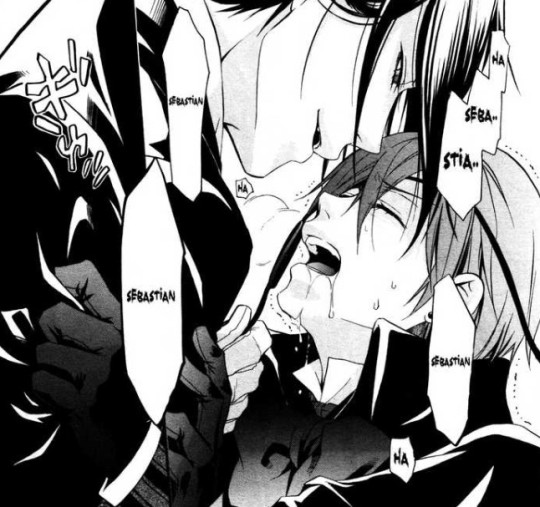
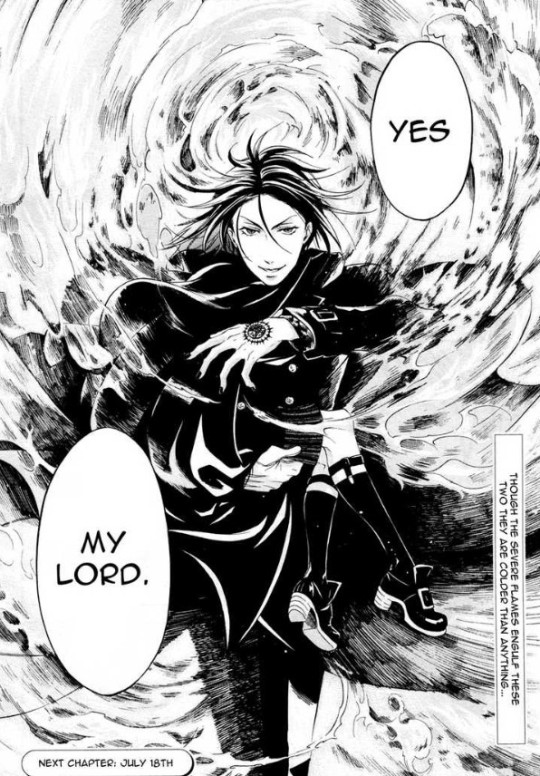
there's a reason ciel's asthma is referenced again in this scene. there's a reason sebastian looks so skip-happy while carrying out ciel's order of burning that bitch to the ground. he doesn't have to question his abilities! he doesn't have to alter the dynamic! he can keep flexing his demon powers anytime shit hits the fan and ciel will always come crawling back to him.
sebastian's fatal flaw isn't just that he's muscle-brained - he's also stubbornly, willfully ignorant of his own weaknesses. sure, he was completely useless in preventing ciel's asthma back at the circus, but that's fine, who cares! he gets to fall back on his strengths and ignore how powerless he actually was.
welcome to BOA! for context, prior to this arc, sebastian rarely, if ever let ciel see him expending any kind of effort, i.e. he's in a constant battle with the servants to keep the manor from descending into chaos and purposefully tries to hide it. this isn't just a butler aesthetics thing, it's also an "I'm a demon and everything is easy for me" thing, to the extent that sebastian continues attempting to uphold his unflappable demeanor when he's quite literally on the verge of collapsing.
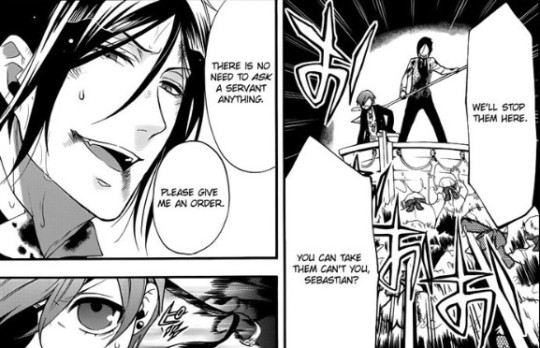
sebastian's tactics aren't all that's challenged in BOA - his entire persona gets irreparably damaged. ciel sees him be outsmarted. ciel sees him injured and genuinely struggling to keep the former safe. this should be very bad news for their dynamic;
except, it isn't.
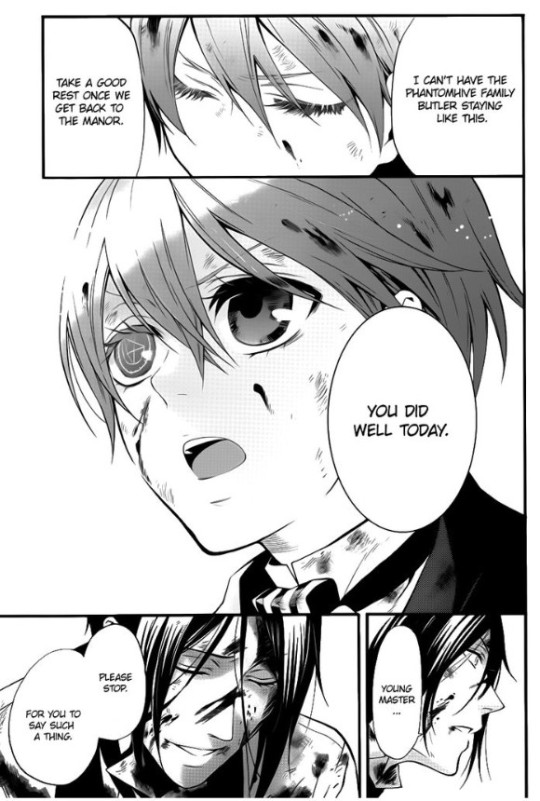
ciel responds so positively that it makes sebastian Yapper Of The Century michaelis momentarily speechless! he then immediately tells ciel to cut that shit out, thus deferring once again to a dynamic that's rapidly crumbling before his eyes and ignoring how effective his accidental appeal to pathos was in retaining and even strengthening ciel's attachment to him.
which leads me to emerald witch, aka the cataclysm for sebastian's change. on top of undertaker being a constant, underlying threat to his food, sebastian ONCE AGAIN has to deal with said food's delicate mortality.
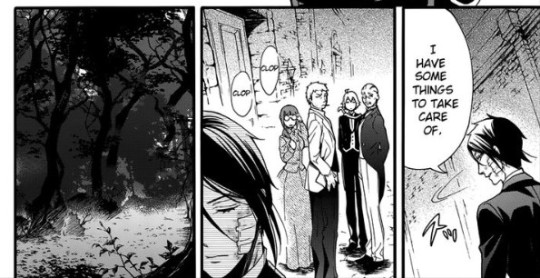
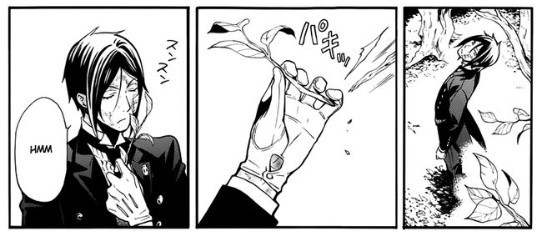
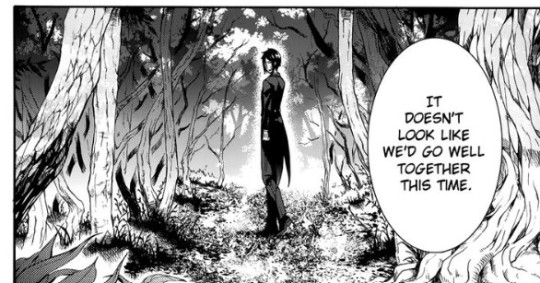
obviously, sebastian is all out of sorts, but his expressions / the way he's framed when he's alone (or not being perceived) absolutely floor me. he looks genuinely distressed after speaking to the other servants. he's drawn in these bird's-eye and wide-shot views while in the forest, creating an isolated, pensive atmosphere and illustrating him (a big, bad demon) as nothing short of small.
he's conflicted. which is weird, right? this isn't the first time his food has gotten sick. moreover, ciel isn't in any active danger - he's having a PTSD response. sebastian is not stupid, he knows this, and should be either confidently reminding ciel of the power he wields or threatening to eat him right then and there; and yet! he waits multiple days before reverting to these (historically effective!!) responses.
it's not just that he's a picky eater - this is sebastian, for the first time in the series, recognizing how fragile ciel's attachment to him is. he's doubting himself. his food no longer views him as its only source of safety, has rejected him, and it's entirely due to sebastian's own negligence.
he's been ignoring his weaknesses. he's been reliant on ciel looking past multiple instances of helplessness in light of how terrified the kid is and how powerful sebastian makes him feel. it's not a coincidence that ciel's near-death experience was exacerbated by sebastian disregarding the former's symptoms to go beat up a werewolf (leaving him ALONE in a foreign, SUPPOSEDLY CURSED castle) until those symptoms, literally, hit him in the face.
it doesn't matter how incapacitated ciel is - sebastian's presence should be enough to calm him, and it isn't, and it's his fault.
this is where sebastian really starts to change. (mind you, the chapter following ciel's initial rejection is titled "That Butler, Change", so do with that what you will.) though we aren't told this explicitly, i think he looks to instances wherein something other than fear drove ciel's attachment (BOA), as well as to the only person ciel would let near him while panicked (finnian, who ciel appears to be closest with amongst the servants and was projecting onto out of grief for his twin). he dials back on the demon vibes. he slowly begins altering his rhetoric.
enter blue cult!
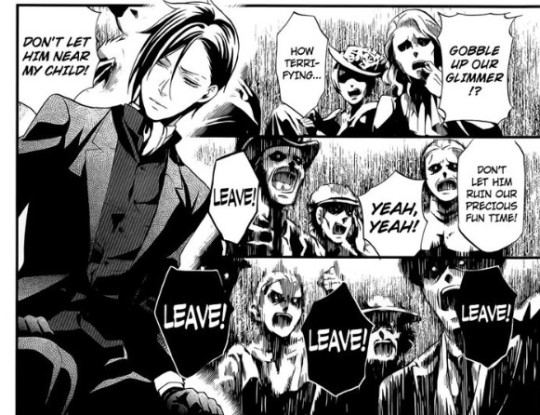
remember what i said about sebastian not wanting ciel to see him struggle? to be cognizant of his weaknesses? as much as the situation was largely out of his control, it's interesting that sebastian allowed his expression to convey upset given that he views emotion of any kind as a weakness.
this isn't to say his sulking isn't genuine - i like to think his clinical narcissist brain was about to pop at the mere thought of not being praised; but! when put in context with his nature, his façade, how every single thing he does is calculated, especially around ciel, this Wildly out-of-character expression gains a new meaning.
another example after ciel returns from getting his blood thieved:
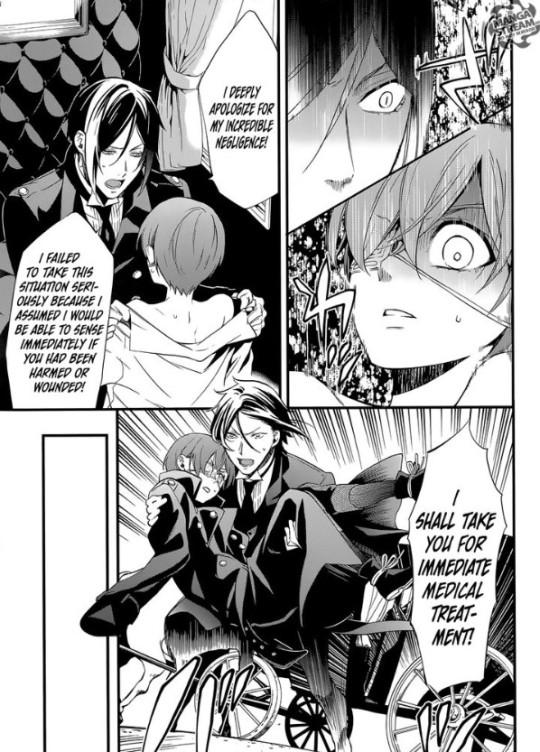
two things: one, sebastian is learning! he almost verbatim references his mistake in emerald witch, meaning he had to have acknowledged it between then and now. two, he does this verbally, explicitly, thereby allowing ciel to witness his panic AND be made aware that sebastian is capable of failure. he could have marched back into the music hall and wrangled the s4. he could have said "ah shit, that's not good, let's go find a doctor". instead, he rambles on about how this is all his fault to a degree that's so excessive it's kind of comical.
and you know what! i don't believe a goddamn word of it. it is so significant that he immediately switches gears after his instinctual big-scary-demon reaction. the sebastian we knew at the beginning of the manga would NEVER let ciel think he was genuinely upset or flawed to the extent of endangering his charge, as that would directly contradict ciel's perception of him as perfect, strong, and safe.
sebastian is thus playing on the dynamic shift that occurred in BOA: he is encouraging ciel to view him as a (rarely!) imperfect being who is struggling to maintain a façade. as someone willing to go to the ends of the earth for him, to care for him, to defy his nature for him, because there are now far too many factors beyond his control to rely on fear alone.
honestly? it's a masterful execution. sebastian's tweaks to his persona are subtle: he gets a little sillier, he offers more praise (under the guise of banter), he tries to make ciel feel bad for "leashing" him.
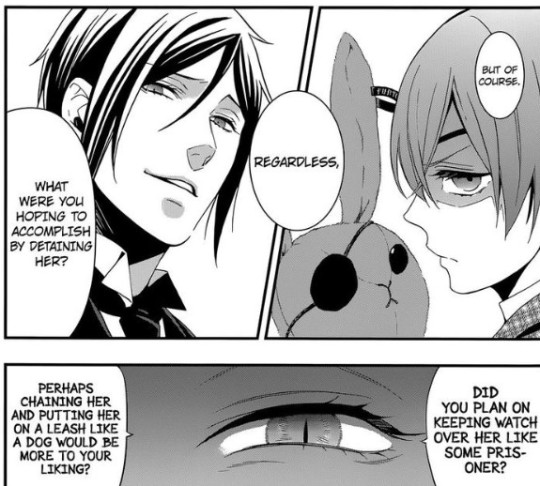
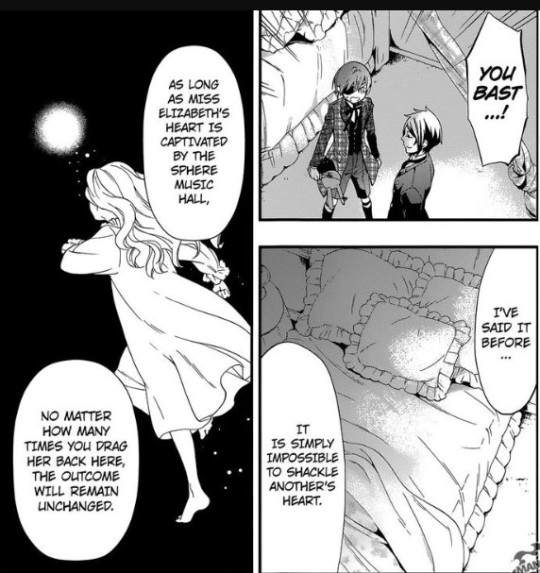
(i wasn't going to include these panels but. dude. the way he backtracks after the initial comparison between himself and elizabeth only to start pontificating about what the "heart" wants. that is such a purposefully dual-ended rhetoric and insane to hear from mr. evil personified.)
he even displays an artfully-skewed version of grief upon finding angi's body (again, that emotion might have been somewhat genuine, but it feels intentional that he chose to express it with ciel in the room) to foster belief that he is capable of like. Caring for people?
circling back to forces beyond sebastian's control, here are two examples of sebastian's reaction to r!ciel's return:
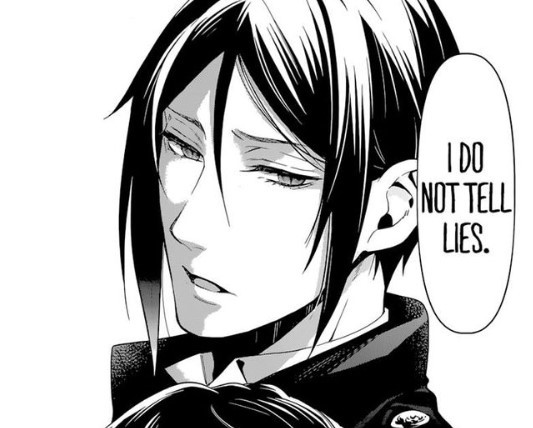
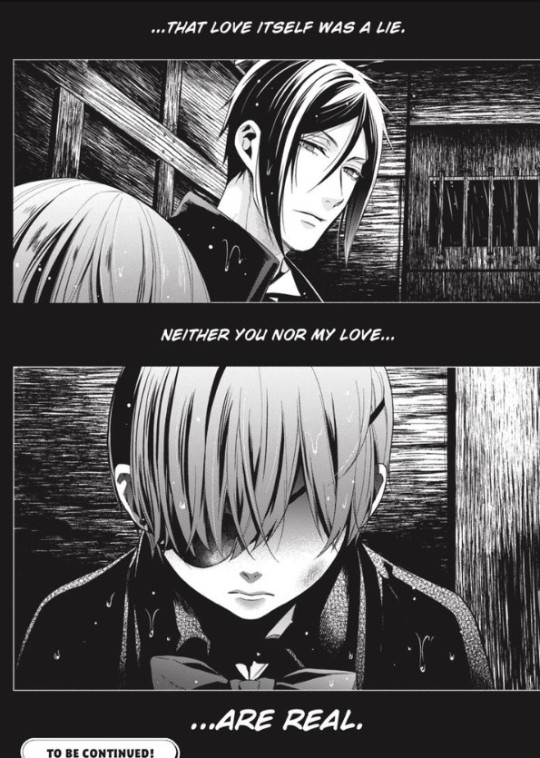
oh BABY. "neither you nor my love are real"?
on-the-nose dialogue aside, sebastian's expression between these panels had me stumped for years. it would make sense for him to convey sympathy to convince ciel of said "love", HOWEVER it's odd that he would continue to do this despite not actively being perceived while in the carriage. something about this feels a little too genuine - especially considering how he's visibly tweaking throughout all of r!ciel's reveal chapters. as much as looking distressed/concerned is likely a conscious decision, i don't think he's fabricating the emotion entirely.
which leads me to: why does sebastian feel the need to alter the dynamic? sure, it was precarious at best and ran the risk of ciel not liking his pet demon all that much, but there's no imminent danger in that. ciel needs sebastian to achieve his revenge and sebastian has made himself out to be the only dependable, constant person amidst ciel's friends/family inevitably leaving him, AND has a trump card of total autonomy over ciel's soul.
... unless, of course, one of the family members he'd lost miraculously came back from the dead, the exact family member sebastian had eaten right in front of him, and was attached at the hip to a creature familiar with sebastian's flaws far before the demon was ever aware of them, that has proved itself more than capable of killing him.
oh he's concerned alright; there is a very real chance that ciel might back out of the contract. he's forgone his revenge before while in a similar trauma-induced headspace; only, this time, sebastian would be powerless to stop him. in truth, at any point since BOA, his meal could have run off to undertaker and there would have been shit all he could do about it. sebastian was slow to acknowledge this, granted, but up until EW there had been virtually no reason for ciel to do something like that.
now there are reasons. and girl, not only is sebastian concerned, i think he's a little scared.
he's functionally lost all ground in keeping ciel dependent on him. it's no longer enough for ciel to regard sebastian as a maliciously convenient product of circumstance - he has to form some other connection.
so, sebastian blurs the line between servant and guardian. he plays on associations he'd established in the past: nagging over ciel's health, taking over his studies, complimenting him, disciplining him, crafting his own form to look remarkably similar to vincent (and no, i don't consider this an instance of same-face-syndrome, look at their bangs. tell me that's not intentional). choices once made out of cruelty, out of a desire to worsen ciel's emotional turmoil, now repurposed to convince him of a devoted, endearingly-demonic parental figure and hoping this will be enough should there come a time wherein ciel is given a choice between two blasphemous falsifications of his family.
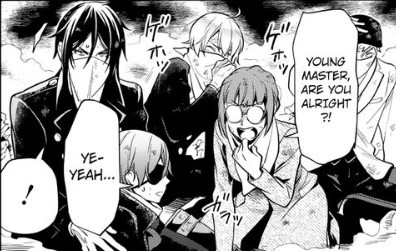
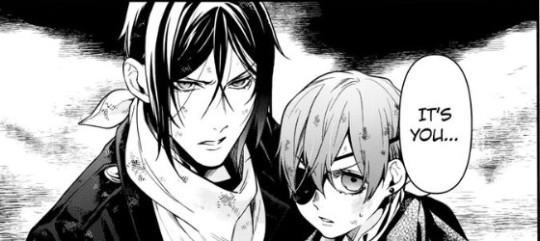
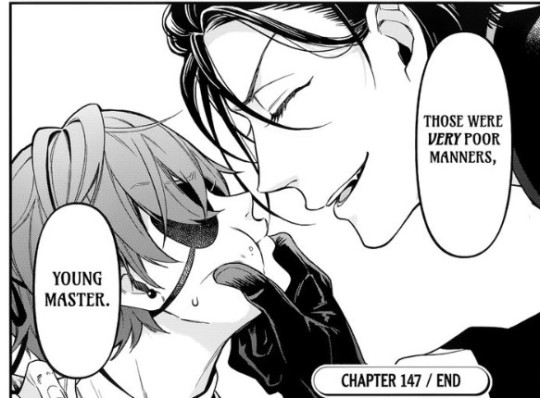
sebastian pivots hard. he avoids relying on his supernatural abilities unless absolutely necessary, despite countless opportunities to do so, to the extent where you almost forget he's not human. he does not leave ciel's side. he lets himself appear dirty and exhausted. he allows ciel to see how uncertain he feels, how helpless he is, knowing the true reason will be lost in translation because ciel is a child, and no matter how conscious that child is of sebastian's nature, he will instinctively revert to seeking out a parent.
the whole "butler aesthetics" shtick flies right out the window at the end of 147. i cannot physically articulate how improper it would be for a servant to grab his master's face and scold him. in front of company. you know who does that? a parent. this is straight up panic on sebastian's part. he is willing to run the risk of acting uncouth in order to brand those fatherly associations right onto ciel's underdeveloped frontal lobe.
and. and this might just be speculation. but.
it's working.
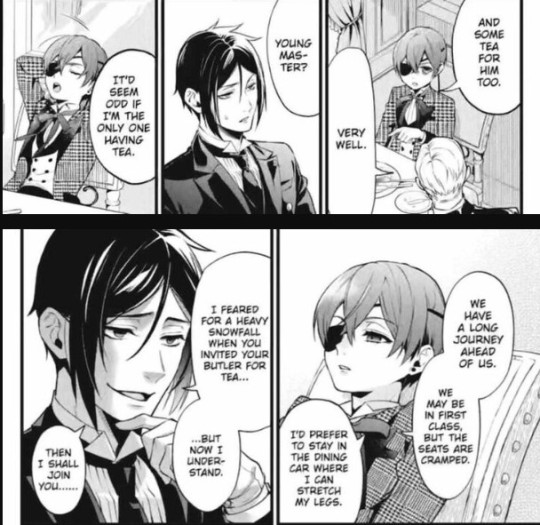
i cannot think of a single goddamn reason for ciel to do this. you wanna know something? his excuse is complete horseshit. sebastian is dressed as a butler, something passengers in a first class train compartment would recognize instantly. even his undercover persona of a valet wouldn't warrant tea with an aristocrat. as much as i'd like to believe ciel is in on the charade, i can't find any evidence nor does it seem realistic that he, a child, would fully grasp that level of manipulation, regardless of how mature he acts.
oh, hey, sebastian's being a little cryptic with that snowfall line. i bet it's completely random and he's never made weather-themed references in any of the prior arcs!
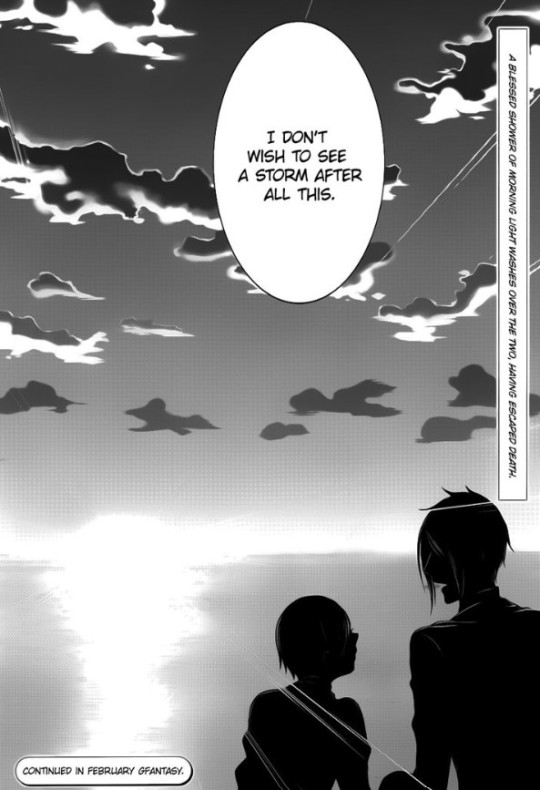
this is. One page. after ciel tells him to take a day off in BOA. he is directly referencing the first time he was made aware of how effective a disingenuous father-son relationship could be.
in BOA, he appears slightly ruffled by the dynamic shift, as this endangered the status quo. in the train car, he's absolutely ecstatic. look at him! that's his "I Just Manipulated This Preteen Sooo Good" face. he looks like an animal. he looks like he's about to turn into a werewolf and jump for joy.
tl;dr: dadbastian is actually so insanely viable, but not in the way you'd think. sebastian in undoubtedly changing, but this isn't an accident or a product of him learning to love or care in any capacity. he is perpetrating the illusion of change, of personal growth in a creature that cannot posses a real identity, thereby humanizing himself in ciel's eyes to keep his food from slipping out of his grasp and it's working so unbelievably well that he's managed to fool a good number of kuro's readers too.
#i know its long please give me a chance#i spent eight hours crafting this#and people say an english degree is useless#also i love sebastian if you can't tell#ohhh he's so INTERESTING#i want to put him in my cauldron and stir him around#black butler#kuroshitsuji#sebastian michaelis#ciel phantomhive#dadbastian#o!ciel#r!ciel#manga#idk how to categorize this#theory#?#obnoxiously long essay?#yana toboso#the woman that you are#man if i'm right the story's conclusion is going to be PAINFUL
529 notes
·
View notes
Text
sinners (2025) in the muslim and arab view: 🌴

---------------------------------------------------
music in islam is a widely debated topic, with many scholars within the religion prohibiting music entirely, while others permit certain types of music and prohibit some. It’s a heated field with conflicting evidence, because while some heavily discourage music, this does not imply that most people will share that viewpoint because music has been ingrained in daily life, whether or not one is muslim.
the general consensus, however, is that one should not be overly affected by music. this is the interesting part because, in sinners, sammie’s father tries and tries to pull sammie away from the temptation of music, but at the same time he doesn’t overly forbid music, and this is seen in the way his father carefully places the guitar on the wall, its seen when his father attempts to persuade him into playing for the choir, and it is also seen when he dejectedly watches sammie walk away with the guitar. so, his father does allow for music, but he confines it within the preaching/religious sense, similar to islam, which is specifically what the other half of scholars permit in terms of music; music that inspires belief, or music that is free of obscenity/debauchery. his father, fearful as he is of ‘dancing with the devil’, is lenient to a spiritually-acceptable form of music.
due to the conflicting opinions on music, modern muslims allow themselves to dabble in casual sin and enjoy music, but it is known to not go overboard. and by overboard, I mean listening to dangerously soul-stirring music, or listening to music in an emotional state, or being too affected by the music/singing (either by the musical instrument used or the lyrics), because in all cases you are entering into a spiritual and vulnerable position.
the one type of music that islam strongly advises against, is the type that “stimulates instincts or arouse desires,”, because once you are in this sphere of vulnerability and spiritual openness, you are inviting ANYBODY in, specifically jinns (beings that are made of fire, not to be confused with demons) and/or shaytan (islam’s cursed name for the devil). as to jinns, islam dictates that they are neutral, invisible beings born from ‘smokeless fire’. like humans, they have a moral compass, they freely follow religion, and they are widely known in the arab/muslim world to be mischievous, and they would not hesitate to possess you if you are emotionally heightened by music. As to shaytan, his one true goal is to derail you from your religious path, so naturally, in this case he would fuel your over-indulgence in music till you lose yourself completely. therefore, piercing the spiritual veil in islam is absolutely not far-fetched, because it is an unsettling occurrence whispered about within arab culture and communities.
when watching sammie pierce the veil and allow the spirits of his ancestors to jointly feel his music, it felt like witnessing the process of a soul readily peeling the veil that separates the seen world from the unseen world, and unknowingly sharing that sensitive and spiritual space with beings that are invisible to the naked eye. in that moment one could say sammie was literally baring his soul for anyone to come and take it. that is why a lot of the muslim viewers were uneased by the scene. to some it was a beautiful synchrony of black culture and music, but others saw the possibility of possession. (either belief doesn't negate the other, just saying!). interestingly, when we see the building in flames and the people/spirits dancing within it, the camera pans out and turns to remmick, as if we are watching the scene unfold from his point of view, and the look of wonder in his face is literally a screen-imagining of how lustful spirits can be towards your vulnerability, because they want that bodily control, they want to fester in your mind, they want to sow discord. that part is especially nerving, seeing the physical embodiment of a dark spirit, enticed and lured by the chance of possession. remmick wanted to possess sammie’s abilities for himself, he wanted to possess sammie’s body and mind, and these desires echo among the jinns as well.

in the arab context, music is in our culture, it's in our language, our poetry, our history. and i'm talking about the arab culture generally, spanning the levantine arabs, the gulf arabs, etc… the arabic language itself is melodic. and yet, because islam and arab culture are parallel, we were raised to beware of immoderation, of being careless with music. there’s a saying that if a musician/singer was extraordinarily gifted, then they infused their songs with magic “sihr”, or they were a witch or they ‘sold their soul to the devil’. in the gulf, there’s a phenomena of singers being visited by jinns in their concerts, where the singer would look down at the crowd and suddenly spot among the crowd’s feet a pair of hooves (jinns can appear as humans, but their tell is always a hoof, a tail, or cat-like eyes), because jinns sure do love to crash a party!
the hand held drum is a cultural instrument that is loved by all arabs, which was popularised by afro-arabs, and has a winning-record of splitting veils and inviting jinns, and this is frequently found in a specific area of music in gulf culture called ‘samry’. it begins with a simple gathering of men, usually afro-arabs, who sit/stand and play hand held drums while incanting famous songs or poetry. similar to sammie’s cyclops guitar, which is a defining instrument to blues music. samry is captivating, it's soul-jerking, it WILL command you to dance, which is why there’s so many cases of possession during samry sessions, where someone would suddenly jerk up and start dancing in a strange, non-human way (another tell of jinns, they dance like animals, it's unnerving).
sinners has a way of showcasing the inextricable bound between music and man, especially the african-americans, and intriguingly, the afro-arabs, who came to the middle east in a rather peaceful way than the former (depends tho, some came by force, some by trade, etc), but the conjoined idea is that they brought music with them, due to the fact that they can speak to music differently, their engagement with it is a way of life that no continent can recreate. sinners have unknowingly (or knowingly, cuz ryan is a genius) tapped into this conversation of the power of sound/music in islam, and of the intricate sub-culture of folk music fostered by afro-arabs. this is a conversation that can go on, and on, and onnnn. But this is my thoughts on the topic.
ty for reading! xoxo
#sinners#sinners 2025#sinners movie#ryan coogler#jack o'connell#michael b jordan#hailee steinfeld#wunmi mosaku#essay#black culture#islam#arab#in conclusion we dont mess around with jinns#remmick#sammie moore#my post#my writing#sinners spoilers
287 notes
·
View notes
Note
Hello. Sorry if this a stupid question u can ignore if u want.
How can someone get better at media analysis? Besides obviously reading a lot.
Im asking this bc im in a point where im aware of my own lack of tools to analyze stories, but i don't know where to get them or how to get better in general. How did you learn to analyze media? There's any specific book, essay, author, etc that you recommend? Somewhere to start?
I'm asking you because you are genuinely the person who has the best takes on this site. Thank you for you work!
it sounds like a cop-out answer but it's always felt like a skill I acquired mostly thru reading a ton, and by paying a lot of attention in high school literature classes. because of that I can't promise that I'm necessarily equipped to be a good teacher or that i know good resources. HOWEVER! let me run some potential advice to you based on the shit i get a lot of mileage out of
first off, a lot of literary analysis is about pattern recognition! not just pattern recognition in-text, but out-of-text as well. how does this work relate to its genre? real-world history? does it have parallels between real-life situations? that kind of thing.
which is a big concept to just describe off the bat, so let me break it down further!
in literature, there is the concept of something called literary devices - they are some of the basic building blocks in how a story is delivered mechanically and via subtext. have you ever heard of a motif? that is a literary device. it's a pattern established in the text in order to further the storytelling! and here is a list of a ton of common literary devices - I'd recommend reading the article. it breaks down a lot of commonly used ones in prose and poetry and explains their usage.
personally, I don't find all the literary devices I've learned about in school to be the most useful to my analytical hobbies online. motifs, themes, and metaphors are useful and dissecting them can bring a lot to the table, but a lot of other devices are mostly like fun bonus trivia for me to notice when reading. however, memorizing those terms and trying to notice them in the things you read does have a distinct benefit - it encourages you to start noticing patterns, and to start thinking of the mechanical way a story is built. sure, thinking about how the prose is constructed might not help you understand the story much more, but it does make you start thinking about how things like prose contribute to the greater feeling of a piece, or how the formatting of a piece contributes to its overall narrative. you'll start developing this habit of picking out little things about a text, which is useful.
other forms of in-text pattern recognition can be about things like characterization! how does a character react to a certain situation? is it consistent with how they usually behave? what might that tell you about how they think? do they have tells that show when they're not being trustworthy? does their viewpoint always match what is happening on screen? what ideas do they have about how the world works? how are they influenced by other people in their lives? by social contexts that might exist? by situations that have affected them? (on that note, how do situations affect other situations?)
another one is just straight-up noticing themes in a work. is there a certain idea that keeps getting brought up? what is the work trying to say about that idea? if it's being brought up often, it's probably worth paying attention to!
that goes for any pattern, actually. if you notice something, it's worth thinking about why it might be there. try considering things like potential subtext, or what a technique might be trying to convey to a reader. even if you can't explain why every element of a text is there, you'll often gain something by trying to think about why something exists in a story.
^ sometimes the answer to that question is not always "because it's intentional" or even "because it was a good choice for the storytelling." authors frequently make choices that suck shit (I am a known complainer about choices that suck shit.) that's also worth thinking about. english classes won't encourage this line of thinking, because they're trying to get you to approach texts with intentional thought instead of writing them off. I appreciate that goal, genuinely, but I do think it hampers people's enthusiasm for analysis if they're not also being encouraged to analyze why they think something doesn't work well in a story. sometimes something sucks and it makes new students mad if they're not allowed to talk about it sucking! I'll get into that later - knowing how and why something doesn't work is also a valuable skill. being an informed and analytical hater will get you far in life.
so that's in-work literary analysis. id also recommend annotating your pages/pdfs or keeping a notebook if you want to close-read a work. keeping track of your thoughts while reading even if they're not "clever" or whatever encourages you to pay attention to a text and to draw patterns. it's very useful!
now, for out-of-work literary analysis! it's worth synthesizing something within its context. what social settings did this work come from? was it commenting on something in real life? is it responding to some aspects of history or current events? how does it relate to its genre? does it deviate from genre trends, commentate on them, or overall conform to its genre? where did the literary techniques it's using come from - does it have any big stylistic influences? is it referencing any other texts?
and if you don't know the answer to a bunch of these questions and want to know, RESEARCH IS YOUR FRIEND! look up historical events and social movements if you're reading a work from a place or time you're not familiar with. if you don't know much about a genre, look into what are considered common genre elements! see if you can find anyone talking about artistic movements, or read the texts that a work might be referencing! all of these things will give you a far more holistic view of a work.
as for your own personal reaction to & understanding of a work... so I've given the advice before that it's good to think about your own personal reactions to a story, and what you enjoy or dislike about it. while this is true that a lot of this is a baseline jumping-off point on how I personally conduct analysis, it's incomplete advice. you should not just be thinking about what you enjoy or dislike - you should also be thinking about why it works or doesn't work for you. if you've gotten a better grasp on story mechanics by practicing the types of pattern recognition i recognized above, you can start digging into how those storytelling techniques have affected you. did you enjoy this part of a story? what made it work well? what techniques built tension, or delivered well on conflict? what about if you thought it sucked? what aspects of storytelling might have failed?
sometimes the answer to this is highly subjective and personal. I'm slightly romance-averse because I am aromantic, so a lot of romance plots will simply bore me or actively annoy me. I try not to let that personal taste factor too much into serious critiques, though of course I will talk about why I find something boring and lament it wasn't done better lol. we're only human. just be aware of those personal taste quirks and factor them into analysis because it will help you be a bit more objective lol
but if it's not fully influenced by personal taste, you should get in the habit of building little theses about why a story affected you in a certain way. for example, "I felt bored and tired at this point in a plot, which may be due to poor pacing & handling of conflict." or "I felt excited at this point in the plot, because established tensions continued to get more complex and captured my interest." or "I liked this plot point because it iterated on an established theme in a way that brought interesting angles to how the story handled the theme." again, it's just a good way to think about how and why storytelling functions.
uh let's see what else. analysis is a collaborative activity! you can learn a lot from seeing how other people analyze! if you enjoy something a lot, try looking into scholarly articles on it, or youtube videos, or essays online! develop opinions also about how THOSE articles and essays etc conduct analysis, and why you might think those analyses are correct or incorrect! sometimes analyses suck shit and developing a counterargument will help you think harder about the topic in question! think about audience reactions and how those are created by the text! talk to friends! send asks to meta blogs you really like maybe sometimes
find angles of analysis that interest and excite you! if you're interested in feminist lenses on a work, or racial lenses, or philosophical lenses, look into how people conduct those sort of analyses on other works. (eg. search feminist analysis of hamlet, or something similar so you can learn how that style of analysis generally functions) and then try applying those lenses to the story you're looking at. a lot of analysts have a toolkit of lenses they tend to cycle through when approaching a new text - it might not be a bad idea to acquire a few favored lenses of your own.
also, most of my advice is literary advice, since you can broadly apply many skills you learn in literary analysis to any other form of storytelling, but if you're looking at another medium, like a game or cartoon, maybe look up some stuff about things like ludonarrative storytelling or visual storytelling! familiarizing yourself with the specific techniques common to a certain medium will only help you get better at understanding what you're seeing.
above all else, approach everything with intellectual curiosity and sincerity. even if you're sincerely curious about why something sucks, letting yourself gain information and potentially learning something new or being humbled in the process will help you grow. it's okay to not have all the answers, or to just be flat-out wrong sometimes. continuing to practice is a valuable intellectual pursuit even if it can mean feeling a tad stupid sometimes. don't be scared to ask questions. get comfortable sometimes with the fact that the answer you'll arrive at after a lot of thought and effort will be "I don't fully know." sometimes you don't know and that can be valuable in its own right!
thank you for the ask, and I hope you find this helpful!
#narrates#thanks for the kind ask! i feel a little humbled by your faith in me aha#this may be a bit scattershot. its 2 am. might update later with more thoughts idk#nyway i feel like a lot of lit classes even in college don't tell you why they're teaching you things that might feel superfluous#hopefully this lays out why certain seemingly superfluous elements of literary education can be valuable#the thing esp about giving theses and having a supporting argument... its not just because teachers need to see an essay or whatever#the point is to make you think about a text and then follow thru by performing analysis#and supporting that analysis w/ evidence from the text#u don't have to write essays but developing that mindset IS helpful. support ur conclusions yknow?#anyway thanks again hope it's illuminating
221 notes
·
View notes
Text

day 1421
#uh just a heads up if you expand the tags to see all there's. a lot. very long#amphibian#frog#poison dart frog#based on my most popular frog to date (day 651)#inspired by everyone pointing out what they think it looks like#here's a fun secret fact the original guy is actually a phantasmal poison dart frog (Epipedobates tricolor)#(according to the original artists title of the drawing)#not Anthony's poison arrow frog (Epipedobates anthonyi)#i feel too awkward to really point it out though because they look the exact same. i cannot tell if there is a difference#im half convinced the same frog was just discovered and named twice#its very curious btw if you go on the (english) wikipedia page for either species it doesn't mention the other#while hereptiles.info (no idea if this is a trustworthy site) lists both names as common names for the same frog (incorrectly??)#while inaturalist lists them as two different frogs. curiously with tricolor having wayyyyy fewer photos#ok anyway that's my rant i went on a whole journey trying to figure out if these are the same frog or not and i have no answer#i did some more 'research' and i am more confused. some sources seem to imply they are now considered the same species ( e. tricolor)#i think my conclusion is i am willing to agree the drawing looks more like e. anthonyi. it seems like tricolor is generally less vibrant re#and the white is darker and more green?#i feel like thumblr should stop me from typing more in the tags at this point this is a whole essay#at this point i am failry convinced this is specifically the Santa Isabel frog. isthat the real subspecies or morph or whatever#or just the name pet sites are using to sell it??#i even found some sources (frog selling websites) refering to it as “Epipedobates Anthonyi 'Santa Isabel' Phantasmal Poison Dart Frog” lol#Anyways if you read this far hi. species are confusing. i am not a frog scientist#the first few tags are like an hour old now i just kept trying to figure it out and adding more tags
3K notes
·
View notes
Text
Oh god, oh fuck, oh no; the parallels between Jean at the beginning of tsc panicking and telling Wymack "I want to go home" and Jean at the end of tsc falling apart after finding out his baby sister has died, telling Neil the same thing.
"I want to go home."
He is only nineteen
#i have so many thoughts about this#but unfortunately the brain fog is BAD#I want to write a whole essay on this and how 'home' meant different things#like how home with the ravens was a nightmare but it was familiar and he knew he would be punished for leaving#but home with the trojans meant somewhere he can rest. somewhere he was starting to feel safe. people that care about him#maybe I'm wrong#maybe he meant home as in marsaille with his little sister#where yes his parents were awful but he could still hold Elodie's hand in his own and read her stories and protect her the best he could#I don't know if I'm making any sense but w/e#aftg#tsc#tsc spoilers#jean moreau#in conclusion: I am crying
524 notes
·
View notes
Text
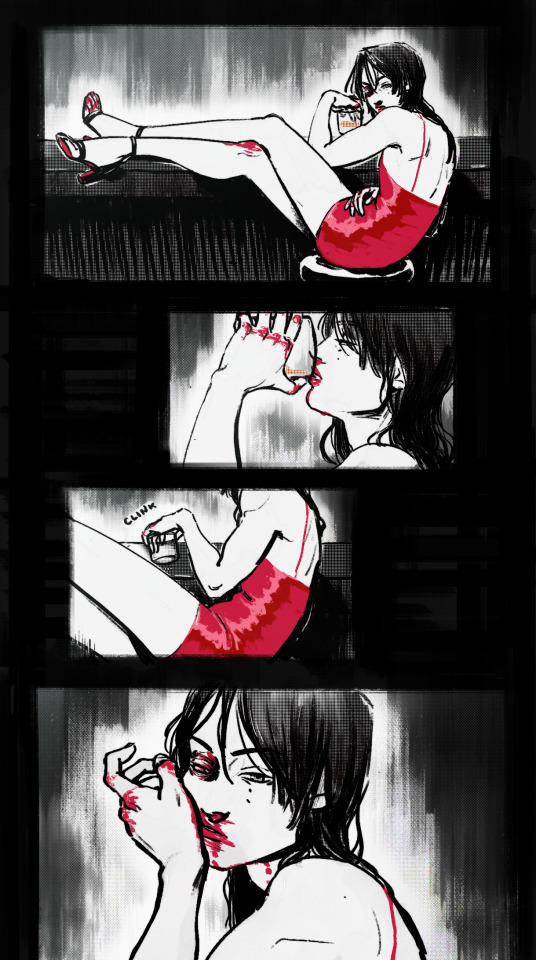
thug beatdown round 2: electric boogaloo
(extras, cw flashing gif:)
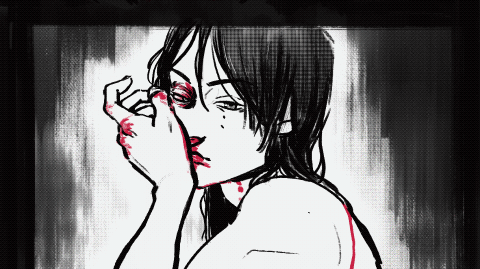
alt:

the fit:
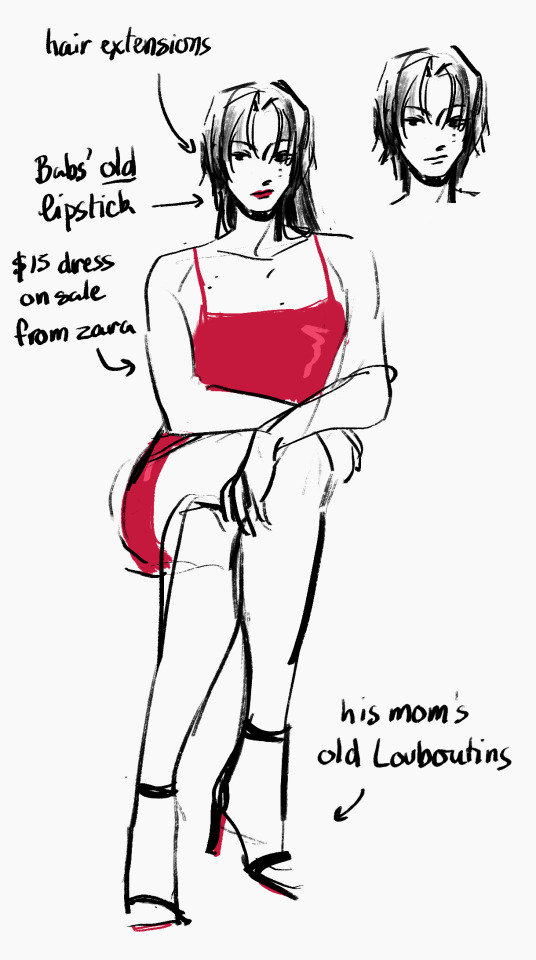
#tim drake#dc#sart#cw flashing#im grateful to the femme tim people for indulging me bc im back on my bullshit#long hair tim!!! LONG HAIR TIM!!!#if dick can have a long hair moment so can tim#further#as a canonical nightwing fan i think tim would at some point try to emulate that (also as a possible successor to the mantle)#(altho the nightwing!damian to batman!cass art i saw once also lives rent free in my mind)#AND if we track the progression of tim's hair from robin to red robin#this is the natural conclusion#in this essay i will—#aside but altho the only time i've seen jack drake drinking in the comics it was beer#we're gonna pretend he was fond of whiskey for the Aesthetic#also traditional upper class white man things#and tim drinks whiskey as a begrudging homage to the father he never really got to share drinks with beyond that one time he got magically#aged up#((i got a new dress and i thought tim would look nice in it))#god i can finally think about other things now
3K notes
·
View notes
Text
GENRE TELEVISION, in fact, follows a literary tradition of illuminating the main plot’s action through comedy. Who can forget Shakespeare’s Fool mirroring Cordelia in King Lear; Falstaff’s antics caricaturing the character conflicts in Henry IV, Part 1; Rosencrantz and Guildenstern’s misadventures anticipating the greater tragedy in Hamlet? As these examples illustrate, comic subplots and dialogue serve a twofold dramatic purpose: permitting subversive themes or transgressions of cultural taboo (i.e. “speaking the unspeakable”) under the guise of absurdity, and thereby foreshadowing or contextualizing major plot events to come. In this essay I will examine how Supernatural season 3 episode 13 “Ghostfacers,” in blithely revealing the series’ central thesis via the line “gay love can pierce through the veil of death and save the day,”
#draw your own conclusions! or: THIS is what you do with a BA in English#this is also to say that essay project I've teased isn't dead! I'm just a bad procrastinator. new year's resolution to finish it#so pls accept this teaser for its thesis as a gesture of solidarity#supernatural#spn#dean winchester#castiel#destiel#spn meta#spn crack#spn is queer#mine
152 notes
·
View notes
Text
realized I've never made a comprehensive image to illustrate wtf I'm talking about irt ford pines and laura palmer because I keep bringing it up but like Okay bear with me I am the complit enjoyer
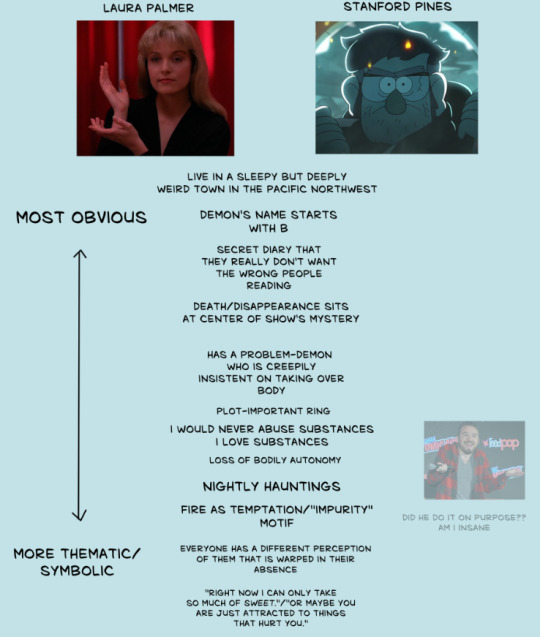
the main reason why it's crazy is because alex has cited twin peaks As inspiration and you could reason that it's mostly surface level/vibes-based but I don't know.... Idk.....
#lab notes#gfposting#filed under 'things I do instead of responding to essay questions'#I also probably could've written down 'fatherly issues of some sort' but Well. uhm. it's different. though I could draw conclusions about#how bill almost certainly plays on ford's deep-rooted motivations to stay in his father's good graces#and on a more broad level the horrors of the american family structure/patriarchal expectations#but let's not get into all that. probably kind of diverging from the main point.
73 notes
·
View notes
Text
Heinz's heritage and relationship to his home culture has always interested me. coming from an immigrant family who was really poor and rural, when my family got to the us there was an effort to "americanize" ourselves. we still keep ties to our culture of course but most of us havent visited the homeland since leaving. and theres been a noticable effort to distance ourselves from our poor and struggling past. (Im sure some previously poor kids will understand or see this in their own relatives. Trying to overcompensate financially, being more materialistic/consumeristic, marrying into rich families/pressure from relatives to "marry rich") This has been going on for some 30 odd years
Heinz's homeland was a bit different from ours, but the fact is theres a lot of negative association with Childhoods and "Home". In most of his backstories there is some reference to cultural customs that he couldnt fit into, abuse/abandonment/neglect, having to fend for himself. Theres so much fear tied to Drusselstein, i would imagine. I can barely remember any scenes of the show where he shares something from Drusselstein in a positive light. And considering him living in the usa for most of his life now, im sure his style, personality, likes and dislikes, and the social norms he practices, has changed dramatically compared to when he was a kid.
His homeland is a touchy subject but not one he ever strays from mentioning. He mentions Drusselstein a LOT. And even goes back to visit (to see his abusive father no less, and give him the garden gnome they lost- both a cultural staple AND point of trauma for heinz) (and another time he goes is to retake the driving test which he is TERRIFIED of).
What i find most interesting is the fact Heinz confronts his past and the culture he grew up in pretty often. He's definitely aware to how its influenced him and hurt him. But when it comes to americanization...well lets look at Roger
Roger, who could easily pass for american-born. He has made considerable effort to rid himself of his previous accent and replace it for an american one. He has successfully imbeded himself into american society- widely accepted and loved, holding office for a considerable amount of years, always dressed professionally, wealthy. Roger has grasped american customs and fit into them incredibly well. But, unlike Heinz, he also keeps positive ties with the family. In all of Heinz backstories, it seems Roger did just fine in Drusselstein.
We also dont get to see much of Roger or get an idea of him outside of Heinz's lens. I have no doubt Roger americanized himself for the same reason many others do- to survive. But when it comes to the pair of them, i would say Roger has an easier time understanding social power and wanted to aquire that in america- much like how he had social power back in their homeland by being the family favorite and performing his social roles well in childhood.
Despite the fact that Heinz's experiences in Drusselstien were more traumatic and negative than Roger's, it seems Heinz is the one that still has the strongest tie to their homeland. It is a central part of his character and his behaviors. He has grown into american culture like most people who immigrated young, but to him, Drusselstein was like Yesterday. I would like to speculate more into if theres any part of Drusselsteinian culture he cherishes. But i cant really remember if there were any foods or traditions or events that left a positive impact on him.
Not really a solid conclusion here but overall. I really am interested by the messy and complicated relationship Heinz has with his status as an immigrant and his hometown. Its such a wound in the way only a childhood home can wound you.
#also heinz did marry rich and now lives on his ex-wifes alimony so he did aquire a finanical cushion for himself#which is a bit of an immigrant stereotype but it is a way some people try to find security after rough childhoods#couldnt find a way to fit that point into the main text#anyway the english major in me misses writing essays like this#and the fun part is on tumblr i dont gotta have a proper conclusion lol#pnf#phineas and ferb#heinz doofenshmirtz#dr. doofenshmirtz#roger doofenshmirtz#character meta#also if anyone wants to add on FEEL FREE i looove hearing other thoughts
107 notes
·
View notes
Note
i'm so curious about your character gender reads now tho 👀👀
(You enter the kitchen and see me, eating shredded cheese out of the fridge by the handful)

(I turn around to face you.)
Hi. Do you want me to sell you on amab NB Siffrin? I'm going to try and sell you on amab NB Siffrin. And maybe even a little bit of tranfem siffrin and/or loop. as a treat. just for you.
So, (I put the cheese back in the fridge.)
This read of mine comes from a number of things, a lot of them to do with the game's themes, and to do with Siffrin being a narrative foil to the other characters. And Vaugarde as a whole.
(READMORE WARNING: THIS IS LIKE 6K WORDS LONG. YOU ALL SHOULD KNOW BY NOW I DON'T MAKE POSTS WITHOUT UNCONSCIOUNABLE AMOUNTS OF EVIDENCE AND EXPLANATION. IF ANYTHING I'M BEING RESTRAINED HERE. THUMBS UP.)
(Pre-readmore note: this is in response to me having given an analysis of how I personally percieve Sifloop in relation to asexuality and shipping. Which you can look at here. (x))
It is however, not what my like, no-holds-barred no-rules just-for-me headcanon for Siffrin would be. (which is intersex 'head empty no thoughts' siffrin, for the record). This is instead my close-reading-of-the-text-and-themes interpretation of Siffrin. This is why I'm gonna be saying Read and not Headcanon, to distinguish the two. (Anything I consider a little bit too much of a stretch vis a vis interpretive hard reads I will call a headcanon. But those are for the last bit of this post.)
Unlike *gestures at mass media* All That… ISAT is already packed to the gills with queer rep, to the point where I feel no need to grasp at straws and make overextended reaches into obviously unintended subtext. Like with, y'know, most media. Since here, the subtext isn't unintended. Like this isn't a Transfem Metal Sonic or Aroace Ash Ketchum situation where I know none of the evidence is on purpose and I'm just having fun making a conspiracy theory pinboard out of it. This is like… There's intentionality there. And I want to engage with it on its level, see what the text itself suggests. It's my personal preferred method of expressing deep respect to a text. (Not that it has to be anyone else's, obviously. This is just my way of showing I love a work.)
So yeah, I am, in general, very interested in hearing hard-fought arguments when it comes to interpreting texts. I'm glad ISAT has a lot to pick at here, and so, I will. (and since not a lot of texts ever have anywhere near this kind of depth in this arena, i don't wanna squander it… i'll try and keep my own biases as in check as i can, and already have done by hashing quite a bit of this interpretation out with two people of very different gender identities to mine. To put it mildly, binary-aligned or transfem I am very squarely Not.)
(Now that the cheese bag has been removed from the equation, I drop this framing device, sit you down at the table and begin to dredge up evidence from below it.)
Okay, so. What are my like… Core reasonings here? I think I can split it into three categories. Broadly, with an amount of overlap, so bear with me…
SIFFRIN AS A FOIL AND CONTRAST TO MIRABELLE, ISABEAU AND THE CHANGE RELIGION AS A WHOLE.
SIFFRIN'S HABITS OF CLINGING TO 'KNOWN QUANTITIES', SCAPEGOATS, AND THEMES OF RACIAL IDENTITY INTERSECTING WITH GENDER IDENTITY.
SIFFRIN, LOOP, DE-PERSONING, DEHUMANISING, APATHY AND SURVIVAL.
Okay so up top I'm going to split my argument for Siffrin's gender identity Present and Future here. This means, for now, I'm arguing for AMAB NB Siffrin alone. The transfem stuff is for later (and more for loop, in my mind, too).
I have a few direct observations of the text here that set things up. Here are the things in-game that make me assume that Siffrin, as of the start of the game, has not yet undergone any radical change to their identity in their life. Not on purpose, at least. These are ordered in a messy but logical flow, so uh, try and keep up. I'll synthesise at the end. I Prommy.
SIFFRIN AS A FOIL AND CONTRAST TO MIRABELLE, ISABEAU AND THE CHANGE RELIGION AS A WHOLE.
CHANGE & THE UNIVERSE: PERCEIVED OPPOSITES
When interacting with most objects in the Changing Room in the house, they express a genuine curiosity toward body craft. It seems they are legitimately unfamiliar with it on a deeper level than having simply heard of it.
Despite this curiosity (explicitly stating they've previously wondered about it), they dismiss it as too much work early on in the game. These points combined seem to suggest to me that they have never previously sought out any kind of real change to their appearance or identity. Either for gender reasons, or other body dysmorphia reasons. (Which, despite the dismissal, they do refer to their body as a 'meat prison', which is not particularly positive) However...
This changes in Act 3. In acts 3 and 4 they flatly state: "You're thinking about crafting your body. You seem to have all the time in the world now." While still never spoken aloud, their declining mental state corrosponds with a worn-down, almost nihilistic reckoning with the feelings they masked with the 'meat prison' joke in act 2.

[Image: Interactions with the change craft textbook in acts 2 and 3/4.]
In talking to Mirabelle, they are very self assured that one can stay the same/be comfortable with their born identity. They also seem a little unsettled by the change religion's flippancy in general, which makes sense, as they have been clinging to the famliar (even when painful) to cope with other traumas. (More on this later, section 2)
The Universe Faith appears to heavily disincentivise Wanting for oneself and other expressions of Free Will due to safeguarding against Wish craft. This seems to have impacted Siffrin's mental state majorly, even if they do not recognise it. The followers of the faith are (if Siffrin is to be believed) incentivised to 'go with the flow' and take paths of least resistance, and those that DO make big decisions will tend to justify things as being The Universe's Will. (See: The King's entire Modus Operandi, and the way Loop (and Siffrin) do the same rote actions, constructing worldviews (the play analogy, the Universe's Will) and justify that as what the Universe Would Want (despite a total lack of evidence to prove as such)) As such, it seems as if a follower of this faith as neurotic as Siffrin would be unlikely to act upon any Wants to Change Themselves without a lot of turmoil and backwards-justification. (Of note, Loop's forcible change coinciding with a dropping of pronoun. But that is again for later, section 3) As of the start of the game, they do not appear to have broached this kind of turmoil directly.

[Image: Act 5 interaction with the star journal, emphasis on it being a cautionary tale against reckless usage of wish craft, instilled so deeply to be a children's bedtime story]
Siffrin, in act 5, grows frustrated with both The Universe and The Change God, feeling abandoned by the former. They struggle with simultaneously anthropomorphising the Universe as a cruel onlooker, while also seemingly acknowledging them as a cold, almost scientific fact of nature. This would heavily imply that the 'blame' put upon the Universe by Siffrin in these moments is known to them, at least a little, to be potentially meaningless. It seems that somewhere in Siffrin's belief system is something, be it the core or merely a creeping worry, that the Universe is not a thinking, feeling, thing. And thus that their invocations of "The Universe's Will" are merely rationalisations of random chance and consequence. This is in DIRECT contrast to the Change God, proven to be an emotive sapient entity, who merely refuses to offer a helping hand. (Similar sentiments are, too, spoken by the Change God itself.)


[Images: Interacting with the window in the observatory in act 5, text from the change god meeting]
So. These are the bulk of my observations when it comes to how Siffrin is positioned in contrast to the Change Belief. It would seem to be that Siffrin, inkeeping with their role as an outsider, is a complete fish out of water in Vaugarde's change-centric world. This makes sense! It makes them a compelling foil to the Vaugardians in our cast, and allows the Vaugardians to challenge Siffrin's worldviews merely by existing. It also, more importantly, makes Siffrin an interesting lens through which to inspect our two most Change-driven characters. Mirabelle and Isabeau.
MIRABELLE.
Mirabelle and Siffrin's differing faiths are put on display the most frequently. Interactions like the circle key and the party's disbelief of Siffrin's facts about the stars make this clear. These interactions other Siffrin from the group further, and are another avenue through which Siffrin can ignore their own needs, not communicating with the party and allowing them to dismiss things he deems important.
Obviously, the friendquest is primarily about Mirabelle's struggle with her aromanticism and asexuality. But there's an implicit undercurrent of gender there too. Mirabelle has never made a big change, not like Isabeau. She has never 'changed completely', by her words. And Siffrin distinctly finds this an odd thing to be worried by. Whatever culture he carries has no pressure to explore these avenues, it seems. Siffrin is able to help her by sharing their honest opinions, that he's never felt the need to change these things, and he's happy (allegedly). Why should she?

[Image: Mirabelle's friendquest text] Siffrin is not thinking particularly hard when he first does the friendquests, they are just being themselves. By positioning Siffrin as this unchanged yet confident object, they are in the perfect position to help Mirabelle by being in her almost exact position, both sexuality and transgender status (albeit, with the caveats of potential alloromanticism, and a they pronoun), that they become her ideal foil. (And in fact, the subtle differences between their positions in canon add to this, showing a display of Perceived Genuine Truth, rather than simple in-group camaraderie)
Whereas…
ISABEAU.
When Mal du pays speaks as Isabeau, it says the following;

"I don't want to know someone who won't even try to change, who luxuriates in things staying the exact same like you do."
I don't want to know someone - Shame of being known, that's Isabeau's insecurity. Reflected back at Siffrin, who has become the worst thing imaginable to each of their friends, in Siffrin's own mind. He absorbs their insecurities like a sponge and incorporates them into himself. Empathy turned ill.
Who luxuriates in things staying the exact same - Now THAT'S interesting. This is not Isabeau's insecurity, it's Siffrin's own. But also, it appears as if, Siffrin, whom to Mirabelle was unflappable in that not changing was alright, has internalised some of her worry. That it is MDP's Isabeau saying this, though, shows this is about Personal Change, perhaps even Specifically Gender and Self Image, rather than Mirabelle's spiritual side.
Isabeau and his distinct change in personality and gender, to become someone who he actually likes… Diametric to Siffrin, who has been stagnant for a long time, presumably as far as they can remember. It would seem to imply they have no recourse against this argument. Siffin becomes, in his mind, the opposite to Isabeau, a man he deeply admires the bravery of when told the story of his Change. These are Siffrin's words against themselves, that they consider themselves to have never even 'tried' whatever it is they think Change to be.
So. These are my main points vis a vis: Siffrin as a foil. This reading would posit that Siffrin's He/They status is, well, almost accidental? Which I would imagine befitting of them. They are, at the start of the game, still the mysterious rogue who never elaborates upon anything. They aren't going to be correcting a they/them from a teammate who is likely far more cautious about assumptions.
Notably, Mirabelle excludes Siffrin from the label "man" in the bathroom monologues… But as does Siffrin when in the prologue poem room. Though one needs remember, Siffrin only expresses these thoughts internally.

[Image: Bathroom conversation featuring Isabeau identified as the party's singular man]

[Image: Prologue!Siffrin expressing that they are not a man in very certain terms.]
While I do wonder what Mirabelle's knowledge (or lack thereof, potentially! Did Siffrin actually divulge this to her, once? Or is she making assumptions again?) is here, this is pretty clear evidence that Siffrin doesn't see themselves As A Man. (that, and Adrienne's word of god "fella" comments). I'm sure you can see where I'm going with this… but.
The thesis here is, that Siffrin may want to explore their gender further; doesn't feel connected to Masculinity, and yet, keeps that He pronoun around? Well, the Universe does not, in Siffrin's mind, really allow for personal wants and desires. If their friends start they/themming them, then cool. They like it, but never requested it, so it's the Universe's will. But, asking? Making decisions and requests and rocking the boat? That seems to scare Siffrin a lot. It seems to scare them so much it causes a lot of, if not all of, the conflict in the game. I feel like it's a fair deduction that this aversion to humour their own desires pervades a lot of their existence.
Plus, I think there's meat there. By only allowing Siffrin to reckon with any potential desires to change only after growing closer with the family, you get to explore things like "How does Mirabelle feel that even the person who said she didn't have to change is changing." and the slightly less potentially harrowing (OR MORE, IF YOU WANT IT TO BE? IDK. I'M NOT YOUR BOSS.) "Isa's continued changing allows Siffrin a space to explore it, maybe even just by proxy, or maybe by joining them."
But mostly, this section is about how Siffrin not having Changed Yet makes them delightfully strong narratively; allowing them to relate to Mirabelle, and get cold feet when comparing themselves to Isabeau. I love this as a narrative strengthener. It's very rare in media that we get to explore a nonbinary character's thoughts and insecurities on whether or not they're "doing enough" to be nonbinary. Even less so Aligned nonbinary people. And reading that alignment and insecurity through the lens of a nonbinary person not fully disconnected from their assigned gender at birth? It's a very compelling exploration of a very common and raw and yet underdiscussed feeling, much like the rest of ISAT. I think this is an extremely potent element should it be read this way, and is only strengthened when taking Siffrin's other themes into account.
Speaking of which.
2. SIFFRIN'S HABITS OF CLINGING TO 'KNOWN QUANTITIES', SCAPEGOATS, AND THEMES OF RACIAL IDENTITY INTERSECTING WITH GENDER IDENTITY.
HOLDING ON TO WHAT YOU KNOW. (OR KNOW THAT YOU DO NOT.)
I explained above many of my thoughts on the Universe Faith, and trying to keep these two sections separate was difficult, but needed to be done for the sake of clarity. But this section and the above are deeply intertwined.
Siffrin… Holds on to the things they know. They do not know much. But man do they fucking hold. And yet, paradoxically, they are also avoidant about it.
It is made clear in the text, to the point where I really don't feel the need to rehash it here, that Siffrin's disconnection from their homeland is incredibly painful, but that they consider that culture utterly and irreplaceably important to them. They cannot face it, it is too painful. They cannot let it go, it is too important.
Knowing what we know of the Island's irl inspirations (though, word of god, the exact location is not supposed to matter, one can infer it from the text (and I did! within reasonable proximity!)), Siffrin is of an indigenous peoples of some description, more than likely. And at the very least, Siffrin carries with them inherent biases and ignorances that show that Vaugarde's conceptions of things don't quite mesh with their own. Bowing to the Vaugardian way of things could very easily be seen as assimilation, in this way.*
And identity? Gender? Presentation? Role? All of that has a cultural element. There's no telling what specifics Siffrin has lost in that arena, and that's the problem. Neither do they. How paralysing, the feeling, to know that should you change yourself you risk unknowingly erasing another piece of home? I wouldn't blame them for locking it off. Keeping their old clothes, keeping what little they can remember of themselves… It doesn't seem to me a conducive or safe mental space to get experimental.
And the Universe makes for a perfect scapegoat. As referenced in the section above, a lot can be justified should you call it "The Universe's Will", because who's there to call you on it? Hardly anyone. Your divine right to Freeze A Place In Time; Your Deserved Punishment for Wanting to be Loved: All of it the Universe-- If you want it to be. And thusly, if the Universe wanted you to be a certain way, wouldn't you already be? Wouldn't it make you so? (Wouldn't it take away your body, that which makes you human? If that is what it thought of you?) So best to put it out of your mind. Wouldn't want to accidentally wish anything.
But as the game itself puts it, personified by The King, you cannot stay mired like this forever. As Loop themselves puts it, they can "get so fixated, sometimes." At some point they need to allow themselves to grow in whatever direction they need, because in the end, they need to live their life. They don't need to abandon their country, their culture, but they can't let it restrain them either.
(* MASSIVE CAVEAT: im white as fuck boyyy. i cant say shit. im like technically Of The Land im like 90% pictish or something ridiculous like that so my particular line has never moved anywhere but. this is notttt something i have input or insight on. this is all gleaned from reading and listening to indiginous perspectives from wherever they may be. i am simply trying to infer from what the game gives us without inserting my own feelings on the matter.)
3. SIFFRIN, LOOP, DE-PERSONING, DEHUMANISING, APATHY AND SURVIVAL.
Alright, here's some less heady and purely-thematic points to round things out. And where we'll also address the fucked up star being in the room; Loop.
My last couple of reading points are the most potentially-transfem to me. Or at least the ones that really hammer home, to me, a seeming lack of want to be masculine-aligned.
ANOTHER NOTE ON THE 'NOT A GUY' THING.
Obviously, there is the aforementioned "Not a man/not that you're a boy" thing. This is rather straightforward, but also still pretty ambiguous. You can be masc-aligned and still Not A Guy. But it does seem to be of note that being a guy very much does not seem to be a goal of Siffrin's. I would posit this in direct contrast to… Isabeau.
But not Isabeau's masculinity. I would instead hold it up against Isa's femininity.
ISAT, as a text, has its characters have genuinely different levels of security in their gender identity, and Isabeau, despite still having insecurities, seems super chill on the gender angle specifically! Their internal strife comes not from their 'not feeling like a man enough' or 'hating being a woman', but instead from their self perception as a friendless nerd! Something that seems to be only tangentially related to Isa's gender, really?
The big dumb bruiser thing is certainly aided by being a dude, but Isa still seems completely comfortable referring to themselves with feminine language, calling himself a "mother hen" (prologue) and having "the heart of a fair maiden" (cookie snack time). (However, they also take being excluded from Mira's girly book club as a surprised compliment, implying they weren't expected to be excluded, and find it affirming.) And even further so, Isa states they want to continue changing further and exploring their identity more, being rather blatant that they might lean back into femininity (and more importantly, let themselves be outwardly smart again), since they're starting to feel hurt by everyone assuming they ARE genuinely stupid.

[Image: Prologue Isa calling himself a mother hen]
And man, this is such a breath of fresh air vis a vis representation. I don't think I really need to explain that. A character who's gender identity is driven by chasing euphoria, even if it started out by trying to drive out misery. Isabeau's character is so damn good. But this essay isn't about him, so get back in the crate, boy.
... So here we have Isa, who is genuinely comfortable reclaiming things about their birth gender, and Mirabelle who loves her traditionally feminine traits to the point where she feels a little guilty that she isn't rejecting them to foster change. And then we have Siffrin… who seems to reject masculine language…? Hrm… (… And then we have The King. A Masculine Title. Someone who Siffrin increasingly sees themselves in and deeply, deeply dislikes this.)
APATHY AND SURVIVAL
It should be clear by now that I see Siffrin's core character as being driven by avoidance and survival. This seems to lead to a lot of apathy, brushing off emotions that are too intense or events and occurences that are too painful. (See: just absolutely everything with Bonnie)
It's all Siffrin really seems to be able to do to Survive. They've travelled, seemingly alone, for what would be around a decade by what the game says about the island's disappearance. They've lived alone on the road as a traveller in a country that so openly welcomes strangers that THE KING and his whole motives can happen. Siffrin is avoidant and refuses to acknowledge problems or strive for help and comfort.
So. That line about the dress. Let's unpack the line(s) about the dress.
THE DRESS LINE, AND THE WAY IT CHANGES BETWEEN PROLOGUE, ACT 2, AND ACT 3.

Good god where to start with this. Full disclosure, the first draft here was way more vague in how I approached this line because I remembered it (and another line, I'll get to it.) way more tame, but going and getting the screenshots..... Siffrin. Buddy. We gotta unpack this.
In act 2, we have "You haven't worn a dress in forever!". This is a neutral, if seemingly a little joyous statement. All we really glean from this is the information that Siffrin at some point, wore 'a' dress. No real inferences there. (Maybe you could say that the singular as opposed to plural makes it more likely that they borrowed/only owned One Dress rather than owned several? But that's a massive stretch...)
Then, act 3/4 shuffles this off into a more general "You wonder if you'll ever wear different clothes again." Which is a more despairing and distant statement. Considering Siffrin seems to travel with only the items they can carry, and owns sleep clothes... It's unclear how many changes of clothing they have. The party seems to consider the cloak a pretty permanent fixture, anyhow. But this line doesn't really say much aside from 'oh god i'm losing myself to the time loop malaise'
NOW THE PROLOGUE. Prologue Sif, buddy, pal, Loop, if I'm allowed to call you that....
Thousands of loops in. We are wistful for specifically dresses. You've forgotten almost everything. You dream about someday seeing the sun again. To be anywhere but here. You want to wear a dress again.
I. Kind of do not know what to do here but point at it. Like I said, my first draft had me half-remembering the progression of this line and as such I was far more vague on what I thought it could imply. Instead this is just straight up yearning.
To, try and segue back to what I had initially written, we'll pick up here...
Siffrin expresses a want to wear other clothes, explore changing their body... But instead, they wear a ratty old form-covering cloak that keeps them warm and safe and is a last reminder of home. They are shapeless, formless, hiding their face under the brim of a wide hat. They do not voice their desire to wear a dress aloud. They once again, keep a desire to themselves, because they do not allow themselves to want publicly. Apathy is safer. Apathy and quiet means you do not risk retribution or hurt.
While I do not think the above is exclusively a transfeminine feeling, it really, really reads like one when taken part and parcel with assuming Siffrin has denied themselves prior exploration.
... And here I have to break my first draft again. I was being, once again, restrained in my reading when writing this. Because I had convinced myself I had maybe straight up imagined one of the lines I was basing my reads on, because I couldn't find it. Because it was a line that read so strikingly desolate to me that my brain had slotted it in during Act Five, meaning when I went looking for it neither me nor my friends could find it.
It's in acts 3 and 4. It's a line I already brought up.

"You're thinking about crafting your body. You seem to have all the time in the world now."
good fucking christ. sorry to break the academic tone but Jimminy Fucking Willikers, Siffrin. What's with that bit. The resignation and despair and guilty comfort we know the timeloop brings them, bleeding into the gender.
This. *taps my finger harshly on my desk* THIS, this feels transfem. this feels so wildly transfem to me. The knowledge that they've never changed before this line lends. The admission that they've been holding back because it's 'too much work'. I spent a lot of time during the game relating Siffrin not to myself but to my friends.
If I'm honest, really, truly, I'm not all too often in Siffrin's shoes. I'm the stable one, of my group. I'm the rock people ground themselves on. And I see so much hesitance, all the time. Denial of joy because what if it's taken away, again? Or futilely out of reach? It hurts more to try, and to fail, than to never try at all.
I wanted to shake Siffrin by the shoulders this whole game. Grit teeth beg them to accept help because for fuck's sake people are clearly offering it get it through your skull--
*coughs* Ah. Ahem. Right. The uh, academic tone.
Right. What I mean to say is, this read as transfem to me because of the way it relates to real-world experiences of denial. And this combo of the Dress line, and the progression of the Meat Prison line, the constant evidence of never having strived for what they want, and that insistance that you're not a man, seem to dislike being percieved as a man, but not being able to shed the outward signifiers?
Individually, yes, these points can be read in different ways. The total opposite ways, even, I'm sure! But as a gestalt it feels really, really transfem. Even if yeah, sure Vaugarde is a magical setting where being transgender is accepted, and this hesitance, specifically, around gender, might not 'make sense' in 'the lore'...
Diegesis isn't everything. Sometimes something that reflects a real-world feeling is important, even if it doesn't 'mesh' with 'the lore' of the world.
TANGENT: DIEGESIS AND READING INTO NON-REAL-WORLD-SETTINGS.
This is a Watsonian vs Doylist spectre that's been haunting this whole argument. In-universe (Watsonian), Vaugarde has seemingly no discrimination between genders, sexualities, and a lackadaisical approach to most things in the arena. Reading our own patriarchal/heterosexual/amanonormative/perisexist society unto it does not make sense, not in this context.
In the real world, however (Doylist), ISAT is a text made in our prejudiced society. A text that is distinctly flavoured by those bigotries which it is kicking back against. Because of this, it is not the whole story to simply read the text while discarding our real-world-informed inferences. Isabeau is a big example of this. While perfectly accepted in Vaugarde, he is very obviously a revolutionary character in our real-world space! He has so much to say, specifically BECAUSE things about him that are not readily accepted here, are accepted there! Same with Mira's struggles, and yes, Siffrin's too.
ISAT was written with the knowledge of how it would play against our real world in mind, we know this, clearly, from many an interview. This is most present in how it engages with asexuality and aromanticism (and immigrant identity), but make no mistake, it influences the Whole Text.
Ergo, just because I view certain writing choices here in the context of Our Real World Perspectives On Gender and not Vaugarde's In-Universe Perspectives, it does not make them an invalid read. They are simply a Doylist read.
There's been an admittedly loosey-goosey lack of delineation here between things I'm reading with either lens, because for the most part all of these points have been a vague synthesis of both that I can't quite decouple. Unprofessional, I know, but I'll admit to not having written my thoughts down like this in a good long while. Usually I just hash this out verbally over discord voice to a small number of weirdo literature and classics student friends who are willing to humour me. I'm an arts student too, but animation hardly required I actually write an essay to a literature degree's standard. Lol.
DE-PERSONING. AND LOOP. OH JESUS . LOOP .
Siffrin de-persons themselves a lot. I say de-person rather than dehumanise because, well, there's a subtle difference there. Siffrin doesn't see themselves as vermin or an animal or an object, but they do seem to see themselves as lesser, not requiring the respect they grant others. They aren't, you know, a 'real person'.
People get to have things like thoughts and wants and identities. Siffrin is, at best, Just Siffrin. They have what they have and they don't ask for more and they don't (CAN'T) feel too strongly on what they do have!
When Loop at first offers their pronouns they offer the Royal 'We'. This is at least a little bit, a joke. A nudge toward their true identity, a potential dig at themselves for becoming so understanding of The King. Mostly though, a joke on the first thing…. and a sign that they do not see themselves as a separate entity to the Siffrin stood before them.
When Siffrin rejects this, they settle for they/them. Loop drops the he/him, presumably partially to cover their tracks, but… They just showed their hand with the 'Royal We', and if you wanted to go even further with this, there's no way for us to know whether Loop is treating this pronoun as singular or not. They presumably are, but it is still a potentially plural pronoun.
Loop… Clearly does not see themselves as a person. It's, I would say, a completely reasonable assumption that the form they have taken reflects implicit feelings toward themselves as less than a person, an actor, a monster, a tool, a means to an end. They are rendered inhuman by The Universe, frivolous distractions removed. No mouth, inventory and clothes confiscated, nothing between the legs. Formed roughly in the shape of a person to allow them to do their only job: Help.
Loop's body does not make logical sense, given their continued ability to sleep, dream and their continued habit of deep breaths to self-soothe. It would seem to me, it was made in the image it was, with only the tools it needed to Help Siffrin. Why obfuscate their identity? Because giving the game away too early would likely make them lose hope. Why so deeply, thoroughly star themed? An instant signal, that even if a stranger, they are an ally. They are home.

[Image: Loop saying that they take naps and dream, and evidence of Loop habitually attempting to breathe in the twohats lose-to-loop ending]
And they… Degender themselves. No longer with any bodily signifiers of masculinity, and cruelly disallowed the ability to hide themselves beneath fabric, they are null. The spoiler Q&A (paratext, as it were) states that:
Q. Is Loop: 1. Actually comfortable with both he and they, but only gave the one pronoun to emphasize the distance? 2. Only using they/them because a large life event led to a shift in identity/ how they’d like to be perceived? or 3. time lops stole he from they they :( A. Mostly that first one. But all three of those reasons have a bit of truth to them.
While the 'mostly the first one' comment does imply that Loop would not baulk at being he/him'd (similar to how Siffrin does not), the other reasons, especially the second, having 'a bit of truth' does lend credence to this reading. That Loop's self-perception has shifted, and what I posit, is that this shift is in tandem with a disconnection with humanity. Due, presumably, to the dehumanising experience of the timeloop.
Loop has no biology to speak of, and yet they remain blind in one eye. I take this as an implication that they considered this so core to themselves, to who they could remember being, that it stayed. Even if they had forgotten their own face, trapped in a part of the house with no mirrors, they knew they couldn't see. They kept this, and yet seemingly they, or The Universe, or both of them in tandem, discarded all else.
This isn't like…. Healthy behaviour. That is for certain. But it is interesting that Siffrin and Loop seem to hold on to their masculinity by a thread, and that Loop, when actually given the excuse to make a choice, chooses the Neutral Option. Siffrin might de-person themselves, but Loop, Loop is absolutely dehumanising themselves. From Loop's own mouth (or lack thereof) do they call themselves a Corpse. That's… pretty damn bad.
TANGENT 2: POTENTIAL IMPLICATIONS OF THE JAPANESE TRANSLATION.
Did somebody say 'distance'? Yeah turns out that has some more potential evidence. In the form of First Person Pronouns. See, English, with its third person only pronouns relies on others to gender you. Japanese, you get to gender yourself. And Siffrin specifically has an interesting discrepancy in the way he refers to himself.
(DISCLAIMER: I . DO NOT KNOW MUCH ABOUT JAPANESE. THIS IS SECOND-HAND KNOWLEDGE. SOURCED FROM THIS TUMBLR POST AND OTHER QUICK SKIMS OF WIKIPEDIA)
Loop and Siffrin use the same, very neutral "mostly male but could go either way" pronoun of 僕 boku. Safe, soft friendly pronoun. Used by people on the younger side of adulthood, not so impolite that you can't use it in a formal setting. Such a neutral all-rounder that female singers in japan tend to use boku in their songs to relate to the audience with quiet confidence.
And in their internal monologue? Siffrin uses a completely different pronoun. In his head, for himself, he uses 自分 jibun. Now, this may be an artefact of the monologue's english second-person "You", since jibun can also be used to mean a very neutral "self". A "myself/herself/himself" type 'self'. But when used as a first person pronoun, it has a connotation of being… distant, introspective. Which is… a fascinating implication, if that was the intent.
But I don't know anything about japanese so ! If I'm off the mark, discard this!
LOOP, PART 2: MAYBE NOT A GREAT STATE TO BE IN.
While Siffrin I can comfortably argue that they can like, keep their current gender presentation, whatever you may perceive it to be, once the game is over, Loop, I cannot.
Siffrin's potential issues with their identity are ones that honestly feel like they would best be explored with gentle refinement and searching. They don't need to violently seperate themselves from what they are now, far from it, in fact. They need to learn to grow comfortable in their own skin, and with the people they love. To become open and trusting, with an open mind to where it may lead.
Loop has already lost this battle. They don't get to refine anymore, just pick up the pieces. While I don't necessarily think radical change is Good for Loop, I think they may Need It. For them, resting will probably become stagnation (see: napping all day under the tree, resigned, really, to the idea they're stuck there forever.), they need a shake-up in order to re-find their feet. Even if they end up right back where they started, they still need to do the actual painful process of soul-searching first.
Problem is, they're still rather avoidant. So it basically becomes a question of getting them into a situation where this exploration is forced upon them. At which point, that's a whole new plotline. This becomes fanfiction. Hence, why while I think Transfem-Egg Loop is a Valid Read when extrapolated from Siffrin… I must concede any actual adventures into them acting upon that as headcanon territory. I just do not know how you would get them there without making a whole new Thing, at which point it stops being Just A Read of the text haha. It doesn't help that Loop and Siffrin (grudgekeepers supreme) both have reason to spite the Change God after who was phone.
As for whether this egg-read reflects directly back on to Siffrin? Maybe! They are the same person. But I think that, especially with Vaugarde's lax views, and their actual differences (Loop's general worse mania // Siffrin's incentive to stay a reminder to themselves and Loop of their country) means they could easily go two different routes, along the road to becoming their own distinct individuals. (And in all honesty, growing into their differences is probably the more healthy option in the long run if you're keeping Loop around? But again, we are going so far into the future here this is no longer a read. And I am not here to dispense baseless headcanons without massive disclaimer, so…)
Tl;Dr:
Siffrin's Survival-Apathy and hesitance to change feels really thematic to their being 'what's left' of their homeland
They seem unsettled by the flippancy of the Change Religion at times, clinging to the familiar to cope with the trauma of displacement.
Mal du pays speaks of them that they have not 'tried' to change, showing an insecurity there, even outside of the literal stagnance of the loops.
They are self assured to Mira that one does not have to change, in a very genuinely personal impulsive statement.
They and others exclude themselves from being "A Man", but Siffrin keeps desires to explore their expression to themselves.
The Universe belief, seemingly in Siffrin's view of it, disincentivises Free Will and Wants very heavily. It is not hard to assume they extend this to all elements of their life.
They have self-admittedly never pursued tangible change, likely due to this aversion to choice. Despite this, they express interest in changing, seeming nonplussed with their body, and house at least some desire for more traditionally feminine expression.
Oh Good God. Loop Sure Does Not Treat Themselves Like A Person. Why Does That Come With A Pronoun Change? What Does That Mean?
But most of all:
It makes them such a fascinating foil and lens to Change and characters who believe in it! It makes them eerily similar to The King! It opens up such fascinating debate between characters like themselves and Mirabelle, Isabeau and Loop, on whether or not they want to change in future, or if it truly is okay to never radically change yourself! What genuinely fertile ground for dialogues. And man if I'm not heavily drawn towards dialogues.
(End of essay! Congratulations for making it the whole way! 🎉 I hope this nightmarish deep dive helps with understanding some of the ways I've been writing Siffrin and Loop too. Since while I've not ever focused on the gender side of it (and probably won't in comic form) this does pervade my view of the two, since it would be impossible for it to Not. As you can see, I do think it is pretty relevant to both their themes.)

(Now for some bonus material)
ADDENDUMS:
PERSONAL BIAS NOTE:
Not included in this analysis since this is more a Pet Theme of my own (usually kept quarantined to the realms of my OCs), but something else I see in Siffrin is a reflection of the Dude Issue(tm) of patriarchal irl society disincentivisng Dudes(tm) from ever fucking introspecting ever.
I'm curious about nonbinary/trans characters who have no idea they’re nonbinary/trans because they’ve been disincentivised from thinking/doubting their identity due to societal power structures or simply tradition. I dig around the themes of “a lot of guys are trapped in a societal prison without ever knowing and it makes them miserable but they can’t escape because they don’t even see the cage” like, a lot, in my personal work. It intrigues me. So bleh, cards on the table there. That mode of interacting with nb/trans characters is one I'm inclined to.
This kinda goes hand in hand with the watsonian vs doylist situation i took an aside to mention. But it is so far along the doylist side that I didn't want to include it, since it is a little too assumptive of the text for my comfort. I don't think the game necessarily has much commentary on this specific Societal Bind. But if it does, then hey, there's my thoughts on it.
STRAY SIDE NOTES AND HEADCANONS ABOUT OTHER CHARACTERS (AS A TREAT FOR GETTING THIS FAR):
MID-GAME OBSERVATION ABOUT BONNIE AND ODILE THAT I NEVER WENT BACK TO VERIFY:
I got the impression that Bonnie heavily favours they/them pronouns for Siffrin, and Odile he/him, as a bit of presumed character voice. I don't know that I am right, literally at all, in that observation, because it very well could've been confirmation bias.
BUT! It did give me the impression that one of the things Bonnie was idolising about Siffrin was a degree of "wow!! older person with my gender!! wow!!", which is just like, cute. I like it even if I don't have any solid evidence.
ODILE, WHAT'S HER DEAL?:
Oh she stays just as mysterious as she intends to be, huh? Even with her comments in the Changing Room alluding to knowing things about underground changing operations, you can't draw much of a conclusion about her. I appreciate verily that she's word-of-god unlabelled and also poly. That shit's great. Woman who has stopped drawing lines or caring what she's up against. Nice characterisation flavour I think.
Anyway, I do think that transfem Odile is a really, really nice take. I have no evidence in either direction for her in either direction, and her being a woman of any description makes her relationship with her absent mother something interesting to chew on, but the idea that she pursued womanhood intentionally lends an interesting texture. I've not much to say, but it's a thread to pull on. Makes you wonder what other female role models she had in her life instead. Anyway she's mysterious as fuck I can't extrapolate Jack nor Squat. Shrug! I'm also made curious by the idea of her potentially moving away from womanhood as she feels the weight of her history lifted. This goes either way, really. Diagnosis: mysterious.
HEADCANON NOTE: INTERSEX SIFFRIN
I don't have any in-text support for this so this entire thing is an unbased headcanon to me. but i DO like it because 1. fun and 2. potential for more thematic exploration
haha gotcha its fuckin themes again. its always themes with me.
But yeah. Not much to say here besides drawing a parallel (that I believe I've seen drawn elsewhere in the fandom already?) between ISAT's comments on how a society that values change would view Aroace identities, and how Mira feels about not wanting to change with the real world experiences of Intersex people having alteration and conformity forced upon them, saying the Change Belief would likely be just as bad for them as it is for aroace people.
So, adding it to Siffrin's situation further drags them into the opposition-to-change foil role. Which like I said, think has a lot to explore.
HEADCANON NOTE: A POTENTIAL METHOD FOR GETTING LOOP OUT OF THEIR GOD DAMNED COMFORT ZONE
I think utilising Loop's contrarianism is an effective and funny way to get them to explore their gender. I personally think running with them trying to hide their identity from the party is a hilarious way to do it. Having them try to position themselves in direct opposition to Siffrin to "throw the party off their trail" (not that i think they really need to?), going full feminine-revealing-clothing because it's NOT what a Siffrin would do and accidentally growing accustomed to it. Funny to me. Especially when the party eventually do find out who they are and go . "????? what was the girl stuff about ??? is that something you wanna do now ???".
[Isabeau] "Ohhhh it was a bit! Haha you really are Sif, still a jokester!" [Loop] "HAHA YEAH . JOKES. LOVE THOSE. LOVE TO MAKE JOKES!" [Isabeau] "Yep! Anyway. Tell me if you need anything!"
Bonus bonus:
[Siffrin] "Okay, so, if you're a girl. Does this reflect on like… me?" [Loop] "No doubles. Get your own gender, parasite~!"
#oh my god this is like 6k words what happened. well you can't say my claims are unsubstantiated i guess.#lucabytetalks#fuck dude i sure do !!!!#i have to assume a lot of other people picked up on exactly what i did too but i dont read other peoples meta very often so !!#i am simply shaking hands with anyone else who came to this conclusion. hi. sometimes its just fun to construct a small essay i guess#i have like no goal putting this out here other than like. For The Sport of Writing Out Media Analysis. so if it makes anything click#in peoples minds or actually sells them on this reading then that's just a bonus i suppose#in stars and time#isat analysis#isat meta#isat siffrin#isat loop#isat spoilers#2hats spoilers#lucabytewrites#welp. no idea what else to tag this. be free and into the wild my gigantic ass post.#is some of this redundant? probably! but cmon man its a tumblr essay i can't format it perfectly. sometimes points get repeated#anyway this post is lagging out my tumblr drafts now i have to post it oh god oh christ i hope nothing goes wrong#edit: i forgot i made the lucabytewrites tag a while back for purrgatorio this can go in there too
459 notes
·
View notes
Text
with the hiatus ending in less than a month i'm casting the dice for kuro finale predictions. a lot of this is based on the manga's narrative style, as well as season one's ending (which, though yana didn't write it, she DID give the production team input). place your bets now!
the manor burns down again. partial credit for Something burning down because yana loves a full circle moment
elizabeth lives and is instrumental for some part of the climax, i.e. crashing out at o!ciel (it's what he deserves).
elizabeth inherits the title of guard dog and maybe funtom. girlboss!
sebastian gets badly injured or nearly dies. i think he needs to suffer a little more (endearing)
the phantomhives' killer is someone we've already met. that's murder mystery ground rule number one baby
bonus points if queen victoria did it! she's the only known character who i can piece together a viable motive for
madam red makes a harrowing return as a bizarre doll
undertaker is a red herring villain BUT knows who orchestrated the phantomhives' murders and/or tried to prevent it from happening. isn't telling o!ciel because that would mean satisfying the contract.
said contract is concluded
r!ciel is definitely dying again. let the kid rest man
tentatively theorizing that rachel phantomhive will be important to the murder reveal in some way. we've seen a lot of vincent thus far and it's suspicious that rachel, who parallels elizabeth in visuals, emotional intelligence, AND moral uprightness hasn't had her moment yet
#and if a few of these happen to align with my personal biases towards storytelling#well!#what can i say#actually what i can say is that i will riot if sebastian doesn't get to eat ciel's soul#poor guy has been going through it he deserves a snack#also i have not a clue how sieglinde or soma or any of the reapers will fit into this#there are so many reoccurring characters whose arcs need to be wrapped up#i have a faint idea of sieglinde's role in the conclusion (children being groomed by adults for selfish purposes) but like.#will she be there for the climax? unsure#black butler#kuroshitsuji#ciel phantomhive#sebastian michaelis#elizabeth midford#o!ciel#r!ciel#undertaker#vincent phantomhive#rachel phantomhive#manga#anime#theory#im starting to consider getting into video essays because i have so many things to say it'd be impossible to fit them into a textpost
310 notes
·
View notes
Text
the Lolita effect present in our pop girlies


Trigger Warning: sexualisation of young girls, discussions of paedophilia (though mild), abusive relationships, daddy issues, that whole gist.
I know a million people have talked about the lolita effect and I know this isn't my typical kind of borderline essay but I just needed to post something about it
I also won't be censoring anything. if I'm going to talk about something, I'm going to talk about it. So reading some parts may be disturbing, because that content is disturbing.
So, what am I talking about? I'm going to be talking about the pop culture impacts that Lolita 1997 has had. When speaking about Lolita, I will be referring to the 1997 movie unless said otherwise because that's what's relevant and what I know the most about. I watched it recently after hearing about it for years in discussions like this one and think it's relevant again.
there may be typos and whatnot, I apologise, reading on screens already wigs me out (I think I need glasses maybe) so proofreading sucks
What is the Lolita effect?
The name Lolita coming from Vladimir Nabokov's book, Lolita, that depicts a paedophile's (the paedophile's pseudonym is Humbert Humbert) obsession with this 12 year old girl, Dolores, through his unreliable gaze. He calls her Lolita as his version of nymphet, a sexual attractive young girl, like minx; a flirtatiously mischievous girl. It should go without saying that Dolores isn't a minx or nymphet. She's a 12 year old girl who is actually quite gross at times, like a 12 year old girl would be. Stomping around, picking her nose, pulling out wedgies in public. But throughout the whole book Humbert Humbert is trying to convince you that no, she isn't a 12 year old little girl, and I'm not a pervert, she's this sex symbol and I'm just a weak man she's manipulating with her body.
Sickening. Disgusting. Gross in every way.
The Lolita effect describes the sexualisation of young girls. A girl with heart shaped sunglasses and pigtail braids sucking on a lollipop while watching the boys, being lusted after by the guys? Lolita effect. Quite literally given this is the cover of many copies of Lolita, despite Vladimir Nabokov's own direct wish for no girl to be ever depicted on the cover.


Vladimir Nabokov's desired cover design of Lolita on the left.
"aesthetic" version on the right.
Well, when did this change happen? Lolita 1962, directed by Stanley Kubrick.

Stanley's movie adaptation of a book that its own author asked for it to never be made as a movie was the spark of this controversy. Then came Adrian Lyne.

This rubbed so much salt in the wound of Lolita being romanticised it became the romanticised Lolita adaption. Blue print if you will. Just read the poster to see why. "Erotic" "stunning and emotionally gripping" "a forbidden love" "an remarkable/unmistakable attraction" "the ultimate piece"
Adrian Lyne himself called it a love story. People had been misunderstanding Lolita for decades, such as in 1959, Robertson Davies, a novelist, said that the theme of Lolita is "not the corruption of an innocent child by a cunning adult, but the exploitation of a weak adult by a corrupt child." which not to get angry, BUT THAT FIRST STATEMENT IS LITERALLY WHAT IT IS. DOLORES IS 12. TWELVE. So, it's not like this adaptation was why people believed this story was okay to romanticise, but the aesthetic sold it.
Lolita 1997 aesthetic
here are some examples of outfits throughout the movie.

very aesthetic, very cute, very 50s americana
defined with pigtails and braids, two piece sets and an American flag colour palette, it was made a very "aesthetic" movie when the contents are literally horrifying. Like I felt ill watching it. As you should because this is a movie about paedophilia. Not love.
Now, how is this relevant? As I showed with the first 2 images of this post, it's become an iconic aesthetic and reference. A 50s Americana aesthetic isn't a Lolita aesthetic, it's an aesthetic that Lolita in the 1997 adaptation shares. However, you'd be remiss not to acknowledge the parallels. Which is where everyone's favourite pop girly right now, Sabrina Carpenter, comes in.
Just aesthetic wise, you can see similarities. Sabrina's aesthetic recently has been very 50's, Americana, gingham, matching sets, red/white/blue/yellow.

There is nothing inherently wrong with this aesthetic. However, there is an issue into feeding into the sexualisation of young girls.
First of all, I just want to say that Sabrina's height and youthful appearance have always been a thing. There's been short jokes made about her since she popped out I'm sure. But there's a difference between "I'm so short" and saying "I'm full grown but I look like a niña" implying that she's a little girl that's legal "come put something big in my casita" casita being a small house, referring to her vagina, and the "something big" referring to a penis. "Mexico, I think you are bonita" for her nonsense outro Mexico n3 of the eras tour of which she was an opener. Already weird, but continuing, in her lyrics, we get "when I love you, I'm sweet like an angel, drawing hearts round our names and dreaming of writing vows, rockin cradles" which there is nothing inherently wrong with, even if it is a bit more child like, like a school girl crush, because she does follow it with "don't mistake my nice for naive" basically saying "no, I'm not this little girl. I'm a woman." which is great. but that goes down the toilet when she chose Juno, a movie about teen pregnancy and a teenager coming to age through that, for the movie she wanted to base her want to get knocked up on. Weird.
But hey, she isn't the woman in the industry we should worried about selling a sexy baby act.
Addison Rae
Addison Rae has come from tiktok, now trying to cement herself at a pop girly, I think she has a market, however, her brand is what's throwing me off.
I've seen endless interviews where she's dressed up in tutu material and bright colours like a kid, speaking in kid like tone, pouting, just really little girl like. Which isn't a crime, until her songs are about sex. she sells 2 narratives in her music. "I'm an innocent untouched girl" and the whore/slut, both words she uses herself.
examples include "losing all my innocence" "untouched" "young" "young, dumb, and cute" "do I provoke you with my innocence?" but switches it around with calling herself a "dance whore" in New York or "with a cigarette pressed between my tits, you know I'm not an easy fuck, but when it comes to shoes, I'll be a slut" in high fashion. Now I am not at all suggesting someone can't be cute and hot, or desirable and adorable, but when promoting a song, which is all about a loss of innocence, implying a loss of one's virginity, "my cheeks are red like cherries in the spring" "im your baby" "losing all my innocence in the backseat" "untouched" "young lust" for reference, playing into this innocent little girl act is weird. She played up that act because its what the public likes. Seductive, yet innocent. 'Make us wanna sleep with you, but dont you dare just give away your virginity, its an important virtue for a young woman.' Does part of this come from the public's madonna/whore complex? absolutely. But there is a difference between coexisting as cute and hot, and sexualising youthfulness. Which is what Addison Rae has done.
"how do you know that she's not just like that?" because she drops it as soon as she wants to be respected. Which I'm sure many women can relate to. Speaking "more like a man" when you want to be listened to. "And I wonder what it says about me that I feel pretty in a dress, but powerful in a suit" as Blythe Baird expresses in her poem Girl Code 101. However, Addison makes sure she's still pretty, hair down, make up on, still youthful looking while I think you'll find women ditch "young" and go for "mature" for a business meeting.
But to tie this all together
Why is this aesthetic and these motifs so prevalent?
Surely not all of these women watched Lolita and said "yep, im going to feed into that" so why are there so many parallels?
well, as Addison says in times like these "am i too old to blame my dad?" referencing daddy issues as the basis of her issues, while on only track 3 of her self titled album saying "wanna roll one with Lana."

and as you can see, Sabrina can be seen here using a Lana Del Rey song while promoting her new song, Manchild, that 2 of those images for that aesthetic example from earlier come from the music video for said song.
Lana Del Rey.
from having a song called Lolita romanticising such, to romanticising such in another song called Off To The Races where she uses lines from Lolita like "light of my life, fire of my loins" which is what Humbert Humbert refers to Lolita as, to romanticising abusive relationships with older men steming from her daddy issues, Lana Del Rey is guilty of pushing this aesthetic and these themes into the mainstream. The similarity between the men and what they are seen doing with the girls to how they're described to the 50's americana aesthetic getting claimed as "so Lana Del Rey" during the born to die era, this is where it comes from. Lana Del Rey's Lolita, 50's americana, sexy baby aesthetic. As Billie Eilish said to every pop girl out there today, "she made you." Lana Del Rey is the blueprint for so many in the industry. This whole rant proves her mark on pop culture. Good or bad.
okay, that's it, I could discuss this further but I mostly wanted to lay this all out so I didn't feel crazy with it all up in my head. byee!!!
#this has no real conclusion just me rambling to be honest#the lolita effect#sabrina carpenter#addison rae#lana del rey#i guess????#borderline essay
46 notes
·
View notes
Text
One of the reasons I don’t agree with the interpretation that Melkor hated and mistreated Mairon is that, instead of being a "more accurate look at canon", I feel like it oversimplifies him and turns him into a flat caricature with no depth.
It's like he doesn’t even need a motive to hate someone, and hatred is the only emotion he’s capable of experiencing nonstop — like breathing. (I know the Valar probably don’t need air, but you get my clever metaphor.) It makes him a very boring and one-dimensional character, and I just don’t think he belongs in that category, even if he is a literal Satan and the root of all evil in Arda. But he still had his own specific reasons for actively loathing someone, even if sometimes those reasons might seem illogical.
He hated Varda because she rejected him. He hated Aulë because they were similar, but Melkor was jealous of his rival’s talents and insecure about his own. He hated Ulmo and his dominion — the ocean — because he couldn’t subdue it. He hated all of the Eldar because he believed they were responsible for his imprisonment in Mandos (since the Valar went to war against him to protect them). He hated Húrin and cursed his family because Húrin disrespected him.
Melkor might have been quick to feel anger, hatred, and a desire to destroy or punish someone — but he still needed a reason for it. When he felt denied, disrespected, threatened, or unable to control something. And I just don’t see Mairon falling into any of those categories.
On the contrary, not only did he willingly accept Melkor as his master and serve him to the best of his ability, but he also admired and adored him. I think even someone as evil and cruel as Melkor would have felt at least some satisfaction in having such a servant — someone who acknowledged him as a leader and as a talented creator. Maybe… he might even have been grateful.
I don't think it’s such a stretch to assume that he could have been pleased with Mairon to some degree. Or that it was absolutely impossible for him to feel any positive emotion when he accomplished something good (good from his own perspective, of course). Mairon, being complicit in all of Melkor’s deeds upon Arda, could very well have earned some rewards for it — and been uplifted above others.
And it’s very much canon that he trusted Mairon the most — that Mairon was his greatest servant and held "the great power" under his command. To me, that suggests something closer to respect (at least to the extent Melkor was capable of feeling it for anyone) rather than hate, and also a recognition of the value of his most devoted follower — loyal from the Elder Days to the very end of their relationship.
#maybe it was meaningless to write all of this cause I know that all parties involved have already made their own conclusions on the matter#I’m probably not saying anything new or interesting even to those people who agree with me#and it’s not like I want to force my opinion onto those who think differently. more like it's for my own validation#because when you regularly stumble upon essays about your fave that don't align with your vision of him at all you feel upset and lonely#and you want to get all the thoughts you have out of your head#and gain more confidence to continue sticking to your own interpretations#I tried to talk here about the canon dynamic but it’s also a post about a ship#so I’ll tag it as such#angbang#melkor#morgoth#mairon#sauron#angbang text#the silmarillion
46 notes
·
View notes
Text
I've seen people talking about Charlie sacrificing himself at the end of ep 7 by taking Jeff's powers, and I don't necessarily agree with this.
I don't think what Charlie does at the end of ep 7 is about sacrificing himself, it's about saving his brother. Any side effects from that are just that. The main point of what he does was that he couldn't bear seeing his brother hurt when he could do something about it, and realistically it is probably (I can't remember if it's canon or not) not the first time he has either offered to or tried to do this.
Yes he has concerningly low self esteem and is very similar to Kenta in the whole idea they have that they are worth less than others. And yes this probably comes from their upbringing, along with Babes habit of telling/implying Charlie isn't worth him (I don't believe that Babe actually believes this but I don't think he realises how much this hurts Charlie). But I don't think that is why Charlie did what he did.
#pit babe the series#pit babe the series 2#pit babe 2#in conclusion they all need therapy#and so will there therapist#and me#i adore kenta#i could write an essay on this#charlie is a good brother#charlie & jeff#i still love babe i just think hes kinda toxic
24 notes
·
View notes